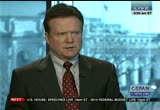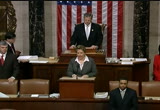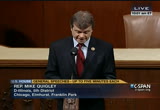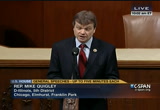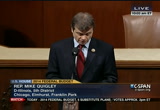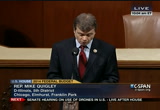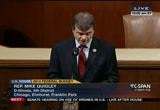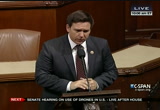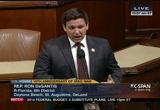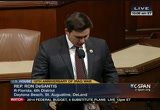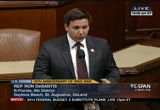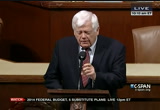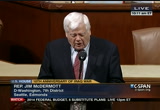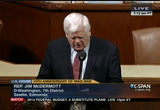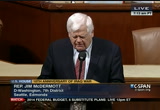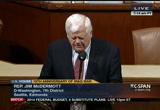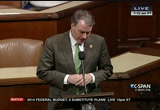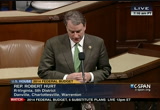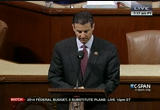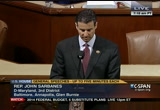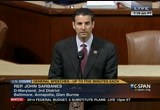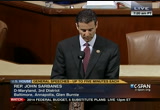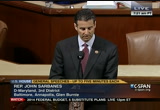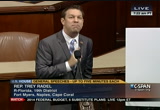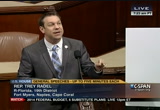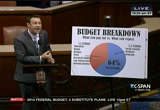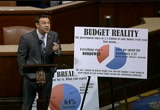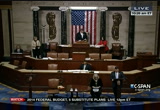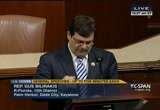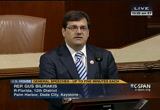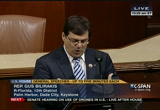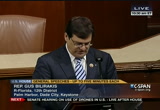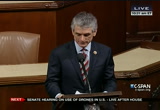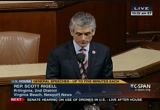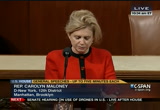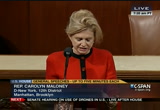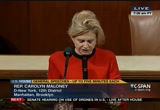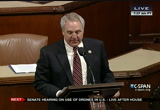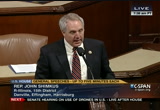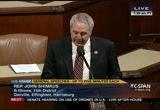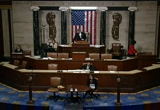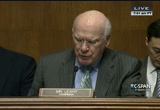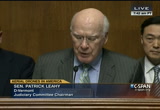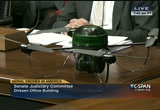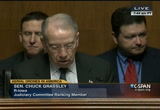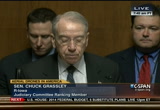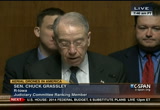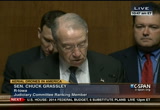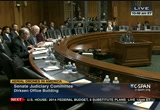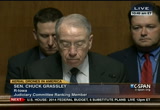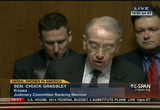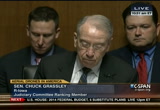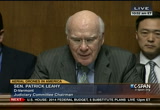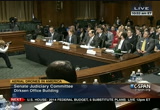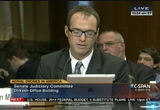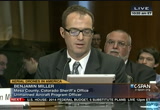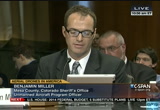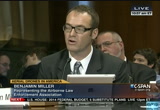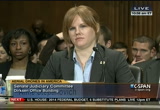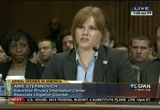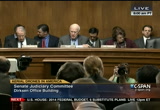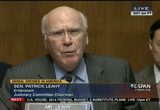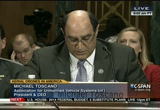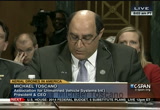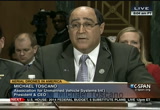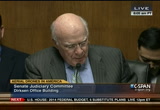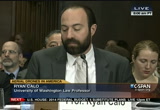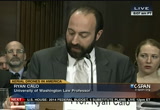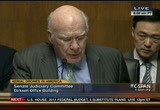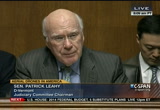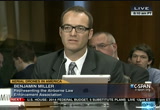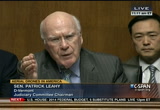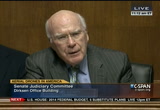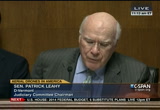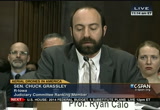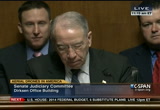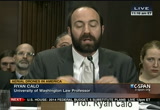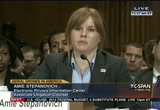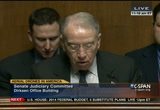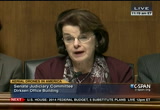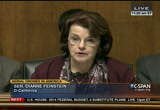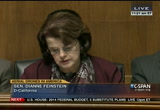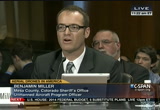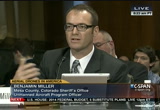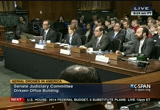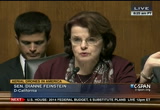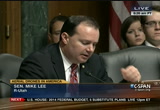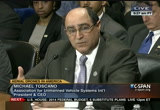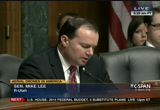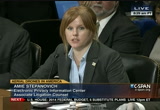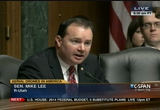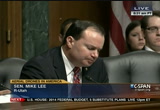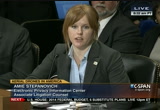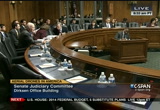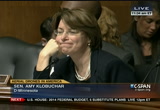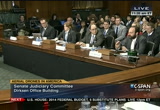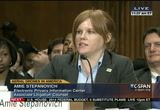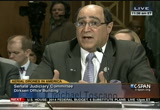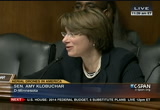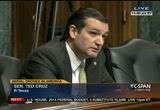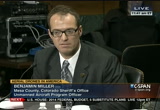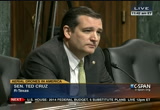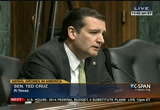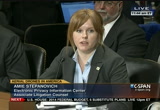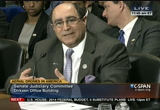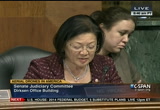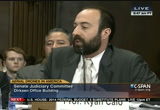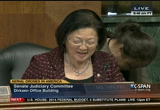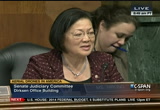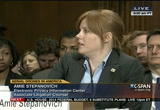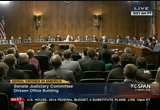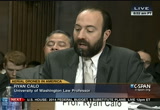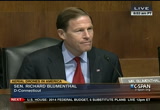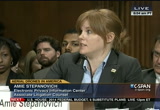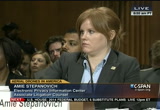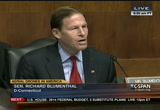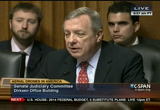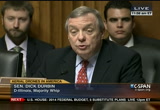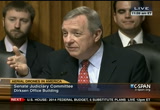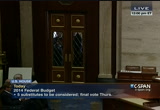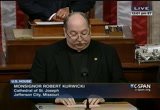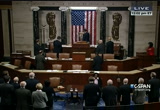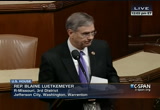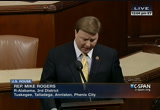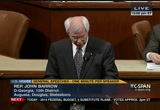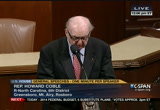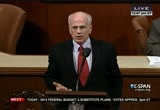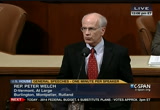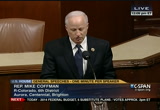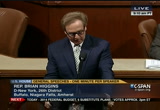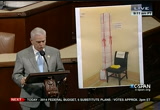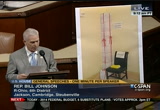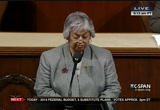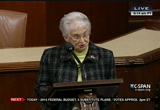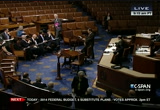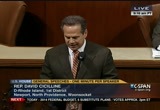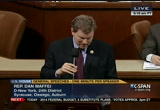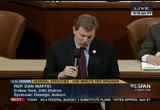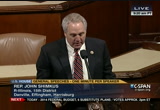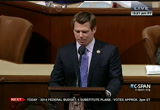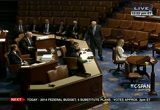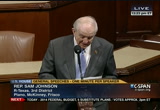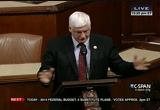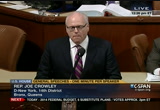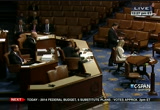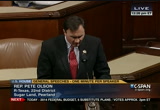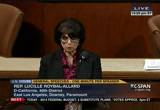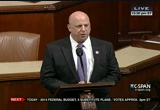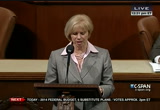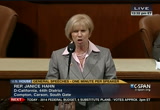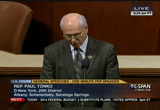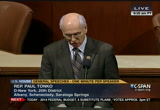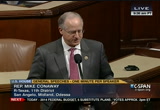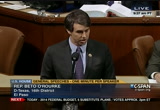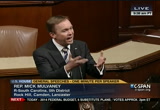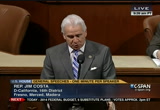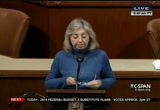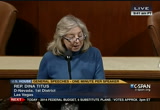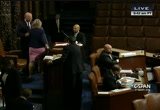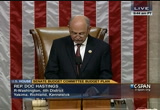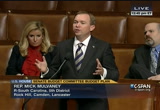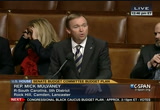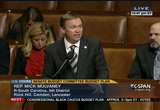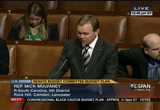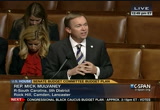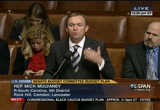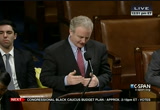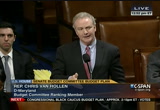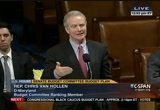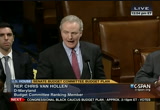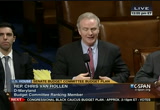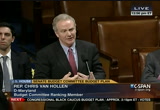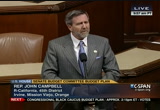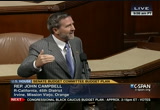tv Public Affairs CSPAN March 20, 2013 10:00am-1:00pm EDT
10:00 am
and afghanistan? guest: i believe the most important thing that needs to be at rest is the backlog of cases. i was stunned when i came to the senate that the backlog of these cases was 600,000. now it is 900,000. that needs to be fixed. host: senator jim webb, democrat, from virginia. thank you, sir, for talking to our viewers. now live coverage of the house as they take up the house budget proposal written by budget chairman paul ryan. the speaker pro tempore: pursuant to the order of the house of january 3, 2013, the chair will now recognize members from lists submitted by
10:01 am
the majority and minority leaders for morning hour debate. the chair will alternate recognition between the parties with each party limited to one hour and each member other than the majority and minority leaders and the minority whip each, to five minutes but in no event shall debate continue beyond 11:50 a.m. the chair recognizes the gentleman from illinois, mr. quigley, for five minutes. mr. quigley: thank you, mr. speaker. mr. speaker, i rise today to call for continued reforms to our health care system. the affordable care act was a huge step in the right direction, but we can do more, because the path we're on is unsustainable. the u.s. spends approximately 18% of its g.d.p. on health, close to twice as much as other developed nations and yet we don't have better health care outcomes. health care costs are rising faster than inflation and
10:02 am
wages, meaning they are eating a larger portion of americans' paychecks and the government's budget. if we continue on our current path, the medicare trust fund will be insolvent by 2024. and medicare and medicaid will grow from 24% of the federal budget to almost 30%, crowding out other needed investments. we have to reduce health care costs in both the private sector and public sector in order to ensure america remains competitive in a global market, but there is a right way to reform our health care system and there is a wrong way. with all due respect, mr. ryan's path is the wrong way. mr. ryan's plan for medicare and medicaid misses the point. his solution simply shifts the costs from government to patients rather than reducing health care costs. under the ryan budget, seniors would pay as much as $1,200 more each year by 2030 and $6,000 more by 2050.
10:03 am
for over half of medicare beneficiaries with incomes less than $21,000, a $1,200 increase is a huge piece of their budget. he also proposes block granting medicaid, which would cut medicaid funding by approximately $700 billion over the next decade and result in 14 million to 19 million people being kicked off medicaid, many of them children and seniors. these steps might make the budget look better but they do nothing to actually reduce the costs of health care and they hurt patients. we can reduce health care costs without harming beneficiaries. here are five steps we should take to reduce health care costs the right way. first and most importantly, we have to change the way we pay providers. right now we pay for each individual test and surgery. we pay for quantity rather than quality of care. providers across the country are adopting payment for
10:04 am
quality models, but they need medicare, the largest payer, to get onboard and pay for quality as well. the centers for medicare and medicaid, c.m.s., just completed a pilot where it bundled payments for 27 procedures and reduced spending by 20%. this needs to be replicated across the board and c.m.s. needs to move patients off fee for service over the next 10 years. c.m.s. needs to restructure and demand competitive bidding. it had a pilot for durable medical equipment and was able to reduce prices by double digits. while i have some concerns about the structure of that competitive bidding program, i believe it does need to be restructured to prevent suicide bidding and expanded to include more medical tests and services such as lab tests, c.t. scanners and other items. third, states need to be incentivized to reduce their health care costs. states like arkansas have taken
10:05 am
bold steps to reduce their health care costs by requiring their two largest insurers and their medicaid program to join a shared savings plan. they are expected to save the state's medicaid program $4.4 million in f.y. 2013 and $9.3 million in f.y. 2014. we should be encouraging other states to follow the path of arkansas and reduce medicaid costs and improve care. fourth, we have to modernize medicare cost sharing and ask a bit more from those who can afford it. we should combine medicare part a and b deductibles and cap them. we should increase means testing for premiums for part b. and we should limit first dollar coverage for high earners. we have to protect our sickest seniors from high costs while asking a bit more from those with greater means. finally, we have to improve price and quality transparency. we should prohibit gag clauses which currently prevent hospitals from sharing health care pricing information. without pricing transparency,
10:06 am
hospitals can't negotiate for the best price for medical devices, and physicians can't make cost-conscious choices for their patients. we do have to reduce health care costs, but there is a right way to do and the wrong way. mr. ryan's way is the wrong path. it fails to reduce underlying health care costs. by pursuing the five proposals i just outlined, we can reduce costs and improve quality, strengthening both our budget and our citizens. thank you and i yield back. the speaker pro tempore: the gentleman's time has expired. the chair recognizes the gentleman from florida, mr. desantis, for five minutes. mr. santis: thank you, speaker. this week marks the 10-year anniversary of the start of combat operations in iraq, and most of the discussion in this town focuses on politicians, pundits and writers and while i don't begrudge people, the
10:07 am
ability to indulge in those types of debates, i do think what's been missing is tribute to the sacrifices that have been made by american service members. abraham lincoln during the civil war wrote, and i quote, this extraordinary war in which we are engaged falls heavily upon all classes of people, but most heavily upon the soldier, for it has been said all that a man hath will he give for his life and while all contribute of their substance the soldier put his life at stake and often yields it up in his country's cause. the highest merit then is due to the soldier, end quote. now, the iraq conflict is much different than the civil war, and one of the ways it's different is that the burden is felt perhaps even more directly on our american service men and women. after all, we did not have and do not have a military draft. most of the folks who were going over there volunteered,
10:08 am
and a lot of them knowing that they would be sent in places like iraq and afghanistan. many of our service members did multiple combat tours, not just for four months or six months, and 2 months and 15 months very hazardous duties. what did they volunteer for? this is not a piece of cake. these were very difficult fights against an enemy by and large did not show its face. the enemy decided to wreak havoc with grow adviced explosive devices and suicide vests. this is a daily reality for our men and women on the ground during this period. when operations did occur between u.s. forces and the enemy, they were often fierce fights in urban cities. the cities like ramadi and baghdad. and of course being on multiple deployments and being gone for so long provided the opportunity for a lot of stress
10:09 am
on families. it's difficult to be in a situation where you're missing a holiday. some of our troops had to miss multiple holidays over multiple years. that is a sacrifice both for the folks who have to be back home but also for the troops who are on the front lines. so lincoln said the highest merit is due to the soldier. indeed. as we look back on the 10th anniversary of iraq, what we see are soldiers, sailors, airmen and marines who have been given the most difficult of tasks and yet they discharged their duties with courage and skill. hence forth, nobody will be able to recount the great feats of some of our services such as the marine corps, from the shores of tripoli to bellawood to gauto canale without mentioning the great feats of our marines in places like fallujah. when recounting the special
10:10 am
operation forces, credit has to be given to the navy seals in iraq during those perilous moments. so with honor, tenacity and distinction, we thank you, the american service member, for the sacrifices you made on behalf of our country. and for those who gave the last full measure of devotion, you have earned a place in the pantheon of america's greatest heroes. we thank you for your service and your sacrifice and i yield back the balance of my time. the speaker pro tempore: the gentleman's time has expired. the chair recognizes the gentleman from washington, mr. mcdermott, for five minutes. mr. mcdermott: i ask unanimous consent to revise and extend my remarks. the speaker pro tempore: so ordered. without objection. mr. mcdermott: mr. speaker, after a painful decade of war, the united states needs to take the time to regain its equal libry up and find -- equalibrium and find peace.
10:11 am
our collective trauma can undermine our country for decades. as ernest hemmingway wrote, the killing is necessary, i know, but still the doing of it is very bad for a man. and i think that after all this is over and we have won the ar, there must be a penas of some kind -- penance of some kind. equally important, despite great efforts of our soldiers to provide civilians an overwhelming number of casualties in war are innocent people. this is a deep cost for those who witness it and are sometimes responsible for it. many initiatives exist that provide help for the men and women who have fought, but we must go beyond the policy initiatives. soldiers returning from war need to share their experience and unburden their souls. our soldiers volunteered to
10:12 am
serve their country in war, but they did not volunteer to take over the entire moral burden that comes with it. our nation needs to discuss the complicated, spiritual and emotional obstacles faced by any society that has waged war. this is not a partisan debate about the rightness or wrongness of war. this is a national effort to take care of our soldiers by publicly sharing some of their burdens. we must be willing to explore the responsibility that comes with asking them to fight. in preindustrial societies, leaders were imnantly involved with war itself, often with a sword in hand, and religious leaders from fully engaged in the aftermath. they dide-commissioned the fighters and the community conscious of the sacrifice. these processes are missing today, and they remain vitally important. the agony suffered by our veterans is vivid testimony.
10:13 am
22 veterans commit suicide every day while an average of almost one active duty soldier a day took his or her life in 2012. that's higher than combat. many other soldiers suffer from posttraumatic stress disorder, become addicted to drugs or alcohol or fall into violence and prison. if a society fails to address these emotional and moral issues publicly, soldiers and vets will struggle with them privately. many of them will lose that struggle and leave us all affected by their loss. the nation requires concrete ways to address the wounds of the war. we need a national day of solemn ceremonies, acknowledging the cost in lives, trauma, lost limbs, families, our renewed commitment to social and health issues of veterans and a discussion about national service for young nonmilitary
10:14 am
americans and a systematic interaction between combat veterans and civilians. marlantis h karl who wrote a book "what it's like to go to war" and another person who wrote about afghanistan and addressed these issues. we propose a commission to examine and articulate the spiritual challenges and to help heal the psychological wounds faced by a nation emerging from a decade of war. we call on the president, the senate majority and minority leader and the house speaker and minority leader to appoint a group of distinguished citizens to explore ways to heal the society. the committee should include veterans, spiritual leaders, psychechologists, journalists, maybe even a poet -- psychologists, journalists, maybe even a poet. it should strive to go into the true moral and emotional consequences that violence always incurs.
10:15 am
it may be hard for us, but we must do it if we are to remain a humane society. some see things as they are and ask why. i dream of things as they never were. and the question we must ask now is why can't we do for our soldiers what needs to be done. . they need to be taken home and received and understood by the populous and understood for what they did for us. the speaker pro tempore: the chair recognizes gentleman from virginia, mr. hurt, for five minutes. mr. hurt: thank you, mr. speaker. mr. speaker, i rise today in support of house budget plan that is on the floor today. i thank chairman ryan for his leadership and positive blueprint for our future. much has been said about a balanced budget over the past couple weeks. while it's important to point out that the house budget balances in 10 years while the
10:16 am
senate's budget never balances, i believe the more important our is why we believe budget must balance. a balanced budget is critically important to all americans and to the future of our great country. we must balance our budget for our senior citizens, who deserve to have security in their retirements. a balanced budget will strengthen critical retirement programs so our seniors are assured medicare and social security will continue to be there for them and for their children. we must balance our budget for our hardworking mothers and fathers across our country, a balanced budget is fundamental to a healthy and robust economy and creates good jobs that american people need to support their families. we must balance our budget for our students. those who are currently in our universities and community colleges should feel confident that an investment in their education will lead them to good-paying jobs when they graduate. a balanced budget gives them that confidence that their future will not be threatened by staggering debt. most important we must balance our budget for our children and
10:17 am
grandchildren who deserve the same chance of the american dream that we have been given. rather than handing them a bill for this generation's irresponsibility, a balanced budget will allow us to hand them a brighter future, an american future. our budget, a balanced budget, represents a departure from the status quo here in washington and it represents house republicans' commitment to moving our nation forward in a fiscally responsible way. i urge my colleagues to support this resolution and i yield back my time. the speaker pro tempore: the gentleman yields back. the chair recognizes the gentleman from maryland, mr. sarbanes, for five minutes. mr. sarbanes: mr. speaker, i rise today to commemorate the 192nd anniversary of greek independence day. greece and america are history's most storied democracies. our founding fathers borrowed heavily from greek antiquity to build american democracy. our relationship with greece, however, is more than one just of philosophical kinship.
10:18 am
america greece, and greek americans have stood in solidarity since the founding of the united states. in this year when we also celebrate the 150th anniversary of the emancipation proclamation, the 50th anniversary of the march on washington, and the 100th anniversary of both harriette tubman's death and rosa parks' birth, it is especially fitting to recall how helene and african-americans have reached out to one another to provide mutual support. when helenes acted to liberate themselves in 1821, james williams, a african-american sailor from my hometown of baltimore, joined the greek revolutionary navy and fought at the battle of navareno. in turn john and fotius, orphans of the greek war of independence became passionate abolitionists in america. they were a member of the educational commission of boston
10:19 am
and new york. f.s.c. a u.s. navy chaplain helped slaves find freedom by supporting the underground railroad. in 1922, recently arrived greek immigrants organized the american hellenic educational and progressive association in georgia to defend themselves against the ku klux klan. a helpa went on to help countless greek immigrants to assimlate into american society and weighed in on many of the most significant social issues of our time. including the movement for civil rights. archbishop, leader of the greek orthodox church of america, carried that commitment forward when he marched alongside martin luther king jr. in selma, alabama, in 1965. an iconic photograph of those two great leaders appeared on the cover of "life" magazine. the historical relationship of these two proud communities embodies the greatness of america. on march 25 when we celebrate
10:20 am
greek independence day, we salute all those who have struggled for freedom and rededicate ourselves to ensuring that america remains a symbol of fairness and opportunity the world over. i rise today also to mourn the passing of legendary greek american andrew a. athens of chicago. andy lived a life that few could match. he enlisted in the u.s. army in january of 1942 and fought at the famous battle of elal amean in egypt. he obtained the rank of captain and in 1945 was honored with the bronze star and u.s. army commendation medal for his outstanding military service. andy went on to become a successful businessman and walked with kings and commoners, spreading the high ideals and values of hellenism. andy was at the forefront of organizing greek americans in their pursuit of justice for cyprus and freedom for the
10:21 am
ecumenical patriarch. for so many what became for him routine endeavors, he embodied hellenism service by giving back to the broader american society. whether it was a heppa, order of st. andrew, or organizations he founded such as united hellenic american congress and hellenic care, the scope of his commitment to a myrrh myriad of important causes was breathtaking. he combined his gentleness of spirit with fierce determination to make a difference. andy's heart was always full as he gave graciously of his time and resources to make this world a better place. above all, andy athens had a deep commitment to family. his beloved wife of 67 years and andy's entire family are in hour thoughts. may his memory be ever eternal. i yield back my time. the speaker pro tempore: the gentleman yields back. the chair recognizes the
10:22 am
gentleman from florida for five minutes. mr. radel: thank you, mr. speaker. i rise today in support of house republican budget, a balanced budget, let me be very, very clear about this. a balanced budget means jobs. again a balanced budget means jobs. think about this. your family at home, you balance your budget. why can't washington? businesses balance their budgets, why can't washington? and what the house republicans did, all we are asking is to balance the budget in 10 years. think about this. if you have a 10-year-old, by the time we balance the budget your 10-year-old will basically be almost done with college. so in a bipartisan fashion i would say look at the 1990's. let's look at president bill clinton who balanced the budget with a republican controlled house. opportunity and jobs ran rampant. we need to return to that today. so we are asking this president,
10:23 am
please, work with us, mr. president. but what's worse than all of this is how senate democrats have failed to serve you. the last time that they even passed a budget was before the ipad existed. before the ipad existed. we are willing to compromise. we are willing to work with people, but how can we work with senate democrats when they are not working at all? they are not doing their job at all to serve you, the american people. their budget right now that they are working on does nothing more than raise taxes. they want more of your money, more money out of your paycheck. ask yourself does washington really need more of your money? we are $16 trillion in debt. we have deficits we can't even wrap our arms around, and they want more of your money. if you were a financial advisor that put you $1 million in debt and ripped through your college savings for your children and all of your checking account and said, just give me more money
10:24 am
and we'll solve the problem, would you do it? absolutely not. more than jobs, though, we are also working to save medicare and social security, the commitments that we have made to the american people. so let's take a look here at the big picture. here's a budget breakdown of where we are at right now. look, your eyes are glazed over and we start talking about the trillions of dollars that we spend, but let's take a look at what you pay versus what you expect. this big blue part right here? that's on auto pilot. no adults have come to the table to talk about where we are at today and how to actually save your social security and medicare and medicaid in this big blue part. we are doing that today. house republicans in balancing the budget. but this is what you expect from the federal government. your education, roads, bridges, a healthy environment, and what's mandated by the constitution, our armed forces to protect us. but this is where it gets really scary. all of this blue part here for
10:25 am
medicare, social security is what we take in. in other words, all of our cash on hand, if you will, the money that you pay the federal government every time you get a paycheck or pay your income taxes, this is all devoted to medicare, medicaid, social security. in other words, everything else, your education, the environment, our roads, bridges, ports, armed forces all of that money to pay for that basically is borrowed. it's just borrowed, or worse just printed. this is the sad reality that we are facing today. but with republican house leadership and working with democrats who are actually willing to come to the table and compromise and not just work with us, work for you, we can save social security and medicare. by the way, when you hear
10:26 am
democrats, or see the videos of them throwing your grandmother off a cliff or telling you that republicans just want to cut, cut, cut, no. this is about save, save, save. and in the words of a hip-hop band from my generation, public enemy, don't believe the hype. house republicans are working today for you. we are working to fix social security and medicare. we are working to save this economy and ultimately this country for you. thank you. i yield the rest of my time. the speaker pro tempore: members are reminded to direct their remarks to the chair. the gentleman yields back. the chair recognizes the gentleman from florida, mr. bilirakis, for five minutes. mr. bilirakis: thank you, mr. speaker. i appreciate it very much. mr. speaker, today i rise to honor and commemorate the 192nd anniversary of greek independence day. like the american revolutionaries who fought for independence and established this great republic we call the
10:27 am
land of the free and home of the brave, greek freedom fighters similarly began an arduous struggle to win independence for greece and its people 190 years ago. of course march 25th. the greeks faced four centuries of ottoman oppression. a david versus goliath situation if you will. beginning the revolution on march 25 was no coincidence. this was the holy day dedicated to the mother of god. and as such they had their champion, their savior, and their protector by their side. the archbishop vowed raise the flag of revolution over the monastery, liberty or death became their battle cry. as is true in our own country,
10:28 am
the price of freedom was great with brave men and women fighting for god and country and the hope of a better world for future generations. our greek broast sacrificed much for their independence, and there are many stories which i could demonstrate the heroism they gibted. most greeks will remember -- exhibited. most greeks will remember a legendary her heo, priest, patriot, and soldier who led 500 of his men in a notable stand against 8,000 ottoman turning soldiers. while the men were wiped out and he fell to enemy hands which tortured him before his death, it became the image for greeks to give all for all, give for love of faith, and homeland. may his memory be eternal, mr. speaker. the revolution brought independence to greece and emboldened those who still sought freedom across the world.
10:29 am
it proved a united people through shear will and perseverance can prevail against tyranny. and it is a sentiment which can still be found among greeks today, mr. speaker. greek soldiers served alongside americans in world war ii, world war i, of course, in the korean war. they have always been our allies, mr. speaker. and continue to be today. this week, the joint naval exercise is expected to conclude, and for the third year the navy's representing the united states, greece, and israel have come together to engage in the maritime evacuations and search and rescue drills. a symbol of the ongoing and growing friendships between the countries. the lessons the greeks taught us in 1821 continue to provide strength to victims of persecution throughout the world today.
10:30 am
by honoring the greek struggle for independence, we reaffirm the values and ideas that make america great. each time i perform my constitutional duties and doing so -- i am doing so in the legacy of our american forefathers and the ancient greeks. as thomas jefferson once said, to the ancient greeks we are all indebted for the light which led ourselves, american colonists, out of gothic darkness. as americans we must continue to pursue this spirit of freedom and liberty which characterizes both great nations. thank you very much, mr. speaker, thank you very much. i yield back the balance of my time. the speaker pro tempore: the gentleman yields back. the chair recognizes the
10:31 am
gentleman from virginia, mr. igell, for five minutes. mr. rigell: i thank the speaker. mr. speaker, i rise to recognize and congratulate an exceptional naval officer, captain andrew shepherd wesson, cull inating as director of the department of navy office for legislative affairs. i'm honored to commend his achievements and recognize his service and devotion to our great country. in 1983 graduate of the virginia military institute, captain witson earned his wings in 1985 and was designated a naval aviator. he flew around the world flying the tom cat and f-18 hornets. he served in five fighter squadrons, participating in multiple combat operations during desert storm and operation iraqi freedom. he's also recognized as the
10:32 am
east coast fighter pilot of the year in 1997. captain witson served as the executive officer and commanding officer of the bounty hunters of fighting squadron two leading them to the u.s.s. constellation including the combat operations in iraqi freedom in 2009 and 2010, he served as commander of the commander of the carrier air wing 17. captain witson is retiring after 30 years of honorable service to this nation. his professional success would not have been possible without the support of his wife, tracy, who i've had the privilege of getting to know and his family and his lovely daughter, alexandria, and their shared sacrifice is a credit to their personal character. i wish captain witson continued success and fulfillment as he transitions to civilian life after three decades of exceptional service to our country. his loyal dedication to duty reflects the highest standards
10:33 am
of naval service. i want to hold high personal regard and consider it a privilege to call captain witson friend and i'm glad that he and his family call virginia's second congressional district home. mr. speaker, i know my fellow colleagues this morning join me, all members of the house in saluting this outstanding naval officer and wishing him and his wonderful family fair winds and following seas. i yield back. the speaker pro tempore: the gentleman yields back. the chair recognizes the gentlewoman from new york, mrs. maloney, for five minutes. thank you.y: as co-chair and co-found irof the congressional caucus on the hellenic issues, i rise today to celebrate the 192 anniversary of greece's declaration of independence from the ottoman empire.
10:34 am
against incredibly difficult odds, the greeks defeated one of the most powerful empires in history to win their independence. following 400 years of ottoman rule, in march, 1821, bishop petras raised the traditional montasary.at the the bishop timed this active revolution to could he inside with the greek -- co-inside ith the greek orthodox holiday . the bishop's message to his people was clear. a new spirit was about to be orn in greece. the treaty of constantinople established full independence to greece.
10:35 am
new york city is home to one of the largest hellenic populations outside of greece. a story of queens, which i have the honor of representing, is often called little athens ecause of the large hellanic population. they have a parade on fifth avenue in manhattan which i've been honored to participate year after year. watching side by side with my greek american friends, i have been overwhelmed by the warmth and enthusiasm of which the community has brought to greek -- to new york city. these events remind us of the many contributions to our nation's history and culture. the friendship between america and greece is based on mutual respect, a commitment to common goals and a sharing of fundamental values, especially ensuring stability in southeastern europe.
10:36 am
i hope permanent solutions can be found for ending the divisions of cyprus and finding a mutually agreeable name for the former yugoslav republic of macedonia. i know that the greek independence movement was an inspiration to the american independence movement, and we have learned so much from our greek friends. i have introduced in many congresses an important resolution with my caucus co-chair, representative gus bilirakis. this resolution urges turkey to respect the rights and religious freedoms of the patriarch. it was my privilege to meet with the patriarch last year, and i know he's negotiating with the turkish government for the return to the greek thodox seminary, the right and independence to educate their priests and to restore their lands to them.
10:37 am
i want to say that i ask all of my colleagues to join me and members of congress in celebrating greece's independence. sincere pleasure to celebrate new york's hellenic community for their many contributions to our country. long live freedom. thank you. the speaker pro tempore: the gentlewoman yields back. the chair recognizes the gentleman from illinois, mr. shimkus, for five minutes. without objection. thank you, mr. speaker. mr. speaker, i rise in support of yucca mountain which by law is designated as the site for permanent geological repository for our nation's spent nuclear fuel. last year the president's blue ribbon commission on america's nuclear future issued a report
10:38 am
but barred from even evaluating the merits of yucca mountain, despite the fact that it has been approved in a bipartisan basis by congress and signed into law by the president -- actually reaffirmed by signing of the law in 2002, the initial law was passed in 1982, and the law was amended in 1987 which in a bipartisan manner passed thue both chambers, signed by -- through both chambers, signed by different presidents, established that yucca mountain would be the repository for our nuclear spent fuel. what the blue ribbon commission did say was any host community should expect incentives. that commitment is no different from nevada when it comes to yucca mountain, and good news. the local county is consenting and ready to negotiate with the department of energy. in advance of yucca mountain even receiving its first delivery, we will work with the state, nye county and
10:39 am
surrounding communities to provide incentives to benefit the people of nevada and their communities. we will address infrastructure needs, providing additional groundwater monitoring, build rail spurs, providing benefits outside of the yucca mountain project. as we look to make nuclear processing viable in the future, we can establish research dollars to our universities in the state to be loords in this field, and -- leaders in this field, and we will best fit their needs. this will mean thousands of direct or indirect jobs throughout nevada. before even of these incentives are discussed, we know the project will yield 2,500 direct jobs on its own for more than 25 years under the current permit. even after 50 years as the project winds down there would still mean more than 500 direct jobs. construction of a rail spur could require an additional 1,000 workers and 300 permanent
10:40 am
jobs for decades to come. all told with indirect jobs and the project alone conservative estimates project 7,000 new jobs in nevada. not even counting for those associated with other incent vet that we in congress -- incentives that we in congress are helping to work with. mr. speaker, we need to finish the lng application on yucca mountain -- licensing application on yucca mountain. it needs to serve as a national asset that develops thousands of badly needed jobs in nevada's struggling economy. thank you, mr. speaker. and with that i yield back the balance of my time. the speaker pro tempore: the gentleman yields back. pursuant to clause 12-a of rule 1, the chair declares the house today.ss until noon
10:42 am
a number of questions regarding the scope of the fourth amendment, injuries prudence. jurisprudence. which can they obtain a search warrant and how long should the data be kept? although no drones operating in the u.s. are yet weaponized, i'm advised, should law enforcement be permitted to equip unmanned aircraft with nonlethal tools such as tear gas, pepper spray? and my concerns about the domestic use of drones extends beyond government and law enforcement. before we allow widespread of drones in domestic airspace, we have to carefully consider the impact on the privacy rights of americans. just last week we are reminded how one company's push to
10:43 am
gather data on americans led to vast overcollection and potential privacy violations. similarly, a simple scan of amateur videos on the internet demonstrates ow prevalent drone technology -- demonstrates how prevalent drone technology is being affected. they can be purchased online for a few hundred dollars and then equipped with high definition video cameras without being detected. it is not hard to imagine the serious privacy problems this type of technology could cause. a state like mine, vermont, we protect and guard our privacy. this is raising some very serious questions from people from the far right to the far left. o we can't take a shortsighted view. technology in this area will
10:44 am
advance at incredible rate. so i hope this hearing will just be the beginning of the dialogue. to help this committee explore some of these issues, senator grassley and i have invited witnesses who will testify. we'll hear from law enforcement officials as a fully operational unmanned unit. we'll hear from the leading unmanned vehicle industry group. a representative electronic privacy information center. and a scholar who has studied the intersection of drone technology. i appreciate them being here. senator grassley. >> before going to my statement, listening to you, i believe i can summarize by saying i don't believe there's any differences between your concern and my concern on this issue and so i'm glad to have that working relationship on this issue. as we examine drone tk nothing -- technologies, we work to
10:45 am
properly balance privacy and public safety. there's tremendous benefits for society from drone technology. the technology can help first responders quickly identify the nature and scope, for example, forest fire, natural disaster. it may help police respond more quickly in cases involving hostage rescue, missing children, child abduction. with drones carrying advanced technology that provide facial recognition, license plate recognition, biometric investigation, important investigative leads can be pursued rapidly. an area where drones may be of particular use is helping secure our vast borders. drone technology is now becoming part of a border security strategy. drone technology can help increase our security on the border while reducing the costs to our taxpayers. the government looks to secure our border.
10:46 am
so i plan to continue discussions with homeland security about their use of it this technology and make sure we're maximizing it. on the civilian side, many questions about drone technology remain. drones can go almost anywhere and have surveillance with some equipment for days. they carry sophisticated technology, greatly enhancing surveillance. the potential benefit of drone technology is limited only by imagination. we must always remember the power of new technology creates greater responsibility to respect the privacy of our citizens. while drones can expand the reach of a criminal investigation, they can also create an increased risk of invading privacy. we need to make sure we have legal safeguards in place while balancing public safety. we need to consider where
10:47 am
government -- what government constitutionally can do. we should examine what limitations are appropriate to protect our privacy. just because the government may comply with the constitution does not mean they should be allowed to constantly surveil like big brother. the thought of government drones buzzing overhead monitoring the activities of law-abiding citizens runs contrary to the notion of what free s to live in a society. the fourth amendment has the consistent meaning, but the tests for determining whether fourth amendment rights have been violated have changed aztec nothing changes. the physical trespass is necessary. for more than 40 years after that, the inquiry has been whether an individual's reasonable expectation of privacy has been violated. the recent supreme court case of u.s. vs. jones examined
10:48 am
whether advanced technology is so intrusive that it becomes a trespass in violation of the fourth amendment. that case is a good starting point for discussion on drones. example, innovations in communication technology, such as mobile devices, have exposed private information to public scrutiny, information once closely guarded is now easily accessible via the internet on simply hand-held mobile devices. these developments and the ability of drones to provide unprecedented surveillance may lead to new standards establishing fourth amendment violations. the use of drones for law enforcement also raises a new challenge for prosecutors. both the chairman and i have at times referred to the famous speech of robert jackson delivered as he was attorney general. in that speech jackson pointed out that it is possible to find at least a technical violation
10:49 am
of criminal law on the part of almost anyone. good prosecutors will use these powerful new surveillances' tools wisely, however, not all prosecutors are as responsible as we expect them to be. and our oversight responsibilities will be even more important aztec nothing evolves. i've always -- i've -- as technology evolves. i've already started asking questions. when the attorney general appeared before the committee, i asked whether the department was using or planning to use drones for law enforcement purposes. to date, i haven't received an answer. this, even after another appearance before us this month. it is very important that the american people know whether and how their justice department is going to use these machines. failure provides answers about is se of these technology
10:50 am
very concerning as well. it may well be subject for further legislation. that's something that the chairman and i obviously will discuss. that is why this hearing is so important. to answer these questions. these questions i can't give you because we don't have time. but whether we draw the limit regarding the use of drones by government agencies, where do we draw that line? under what circumstances do we require a search warrant? should police use drones only for surveillance? should local governments be allowed to use drones to search for traffic violations and building code violations? should the federal government be allowed to use drones to follow around disability claims to see whether they're fraudulent? what reasonable limitations are appropriate for where and when to use drones?
10:51 am
additionally, in examining the use of drones by the congress, congress also needs to -- by the government, congress also needs to limit the use of drones by private citizens in the private sector. where do we draw the line in balancing the media's rights under the first amendment or the citizens' right to be protected from invasion of privacy? another area to examine is innovative use of drones and so coming from a rural state, as the chairman does, we have a lot of agriculture. drones can be used by farmers to be provide a bird's eye view of a farm and help survey crops quickly for early signs of pests or disease. drones may be able to spray vigor, maintain their prevent theft. these are cost saving benefits to agriculture. but no farmer would appreciate government drones playing the
10:52 am
role of big brother. and no one wants drone technology to end up in the hands of our harassing neighbor, child predator, stalker, drug dealer, violent criminal or terrorist. we face challenges and balancing privacy, public safety and this is a very appropriate hearing for this committee to have. thank you, mr. chairman, for your leadership. >> thank you very much. our first witness is ben miller, who's probably listening to what we're saying here and wondering where this might lead. he's a 13-year veteran of the sheriff's office in mesa, county. he's part of the mesa county sheriff's office, unmanned aircraft program manager. a designation you would not have seen in many sheriff's offices just a decade ago. he's a representative of the
10:53 am
airborne law enforcement association. he's assisted the federal aviation administration with developing regulations regarding the public use for unmanned aircraft systems. what i'm going to do is put all statements in the record as though read in full, but if you'd like to summarize, please, mr. miller, we'd appreciate it. >> is it on? >> yeah. >> well, good morning, chairman leahy, and members of the committee. my name is benjamin miller, unmanned aircraft program manager with mesa county sheriff's office and representative of the airborne law enforcement association. thank you for inviting me to speak about the use of unmanned aircraft in the small colorado community where i live. the mesa county sheriff's office is a middle-sized agency about 200 people with a patrol team of just 65 deputies. these deputies serve approximately 175,000 citizens who live inside a 3,300 square mile county. we see a wide range of criminal
10:54 am
activity from petty offenses to drug trafficking and homicide. we've flown more operational hours than anyone else in the country with 185 hours and just over 40 missions. with two small battery operated unmanned aircraft systems, that's a lot considering the dragon fly requisites, as this one on the table, is a backpack-sized helicopter which can can fly for only 15 minutes and weighs two pounds. falcon can fly for over an hour and fit in the trunk and can -- and you can buy the very same camera that we put on the dragon flier at wal-mart. i want to show you brief examples of how we use this equipment. my first example occurred last may when a historic church caught fire. we were allowed to show the hot spots which needed to be properly extinguished. firemen were able to assess the situation and address it accordingly as these areas were not viewable to the naked eye.
10:55 am
we flew about 600 feet in the air and took pictures that the arson investigators were determined to tell which way the fire went through the building. my next example when a 62-year-old woman went missing. we launched the falcon. we were able to cover large areas in a short time which would normally take longer, involve more resources and cost more money. the woman's body was recovered. the use of falcon allowed us to more directly apply resources in that recovery effort. my final example occurred just days ago, really doesn't have a whole lot to do with law enforcement but it does offer a glimpse in the benefit of unmanned aerial systems and that is affordability. mesa county spends nearly $10,000 of a survey of our landfill to determine an increase in waste over the previous year. my team and i completed that survey for a mere $200. by flying back and forth over the landfill we were able to
10:56 am
combine the photos that we took with geographic references data and provide a volume of the landfill to an ackrass is i of 10 cubic centimeters. while they fly sometimes days we fly just minutes to photograph a crime scene and cannot exceed an hour of flight time. the f.a.a. have strict protocols that allows us to fly during the day and we cannot fly more than 400 feet off the ground. while military unmanned aircraft are both large in size and cost, our equipment is small and relatively inexpensive. our equipment does not possess the capability to carry sensors that can read license plates from space or look through your home or carry weapons. just recently, i was on the airborne law enforcement association's website and found a 1934 photo of an airborne police officer in a gyro helicopterer. aviation and public safety have a longstanding relationship. while unmanned aircraft cannot recover a man in a river, they
10:57 am
-- i estimate unmanned aircraft can complete 30% of the missions of manned aviation for 2% of the cost. the mesa county sheriff's office projects direct costs of unmanned flight at just $25 an hour. as compared to the cost of manned aviation that can range from $250 to thousands of dollars an hour. it costs one cent to charge the battery that we use inside our system. my agency's use of unmanned aircraft is primarily for srch and rescue and crime scene reconstruction but it must be said that every tool can be abused. it didn't begin with unmanned aircraft. while the use of manned aircraft requires specific policies and procedures, the handling of sensitive photographs and video has been around law enforcement for years. i can speak to a strong code of conduct policy inside my own agency that addresses more than just the use of unmanned aircraft. leadership organizations like the international association of chiefs of police, have
10:58 am
recently released unmanned aircraft policy guidelines that encourages agencies to adopt nonretention policies whereby the information we collect that is not determined evidence is deleted. these guidelines have also been endorsed by the airborne law enforcement association and it is with their guidance that agencies like mine are developing robust policies, quality training tools and professional unmanned aircraft programs. in closing, you i hope my testimony have offered a realistic opportunity of the benefits of unmanned aircraft. thank you for the opportunity. >> thank you very much. r next witness is amie stepanovich. did i pronounce it correctly? >> stepanovich. >> stepanovich. sorry. director of the domestic surveillance program. her work is specifically focused on the fourth amendment and drones surveillance. received her j.d. from new york
10:59 am
law school, bachelor of science degree from florida state university. please go ahead. >> thank you, chairman leahy, ranking member grassley, and members of the committee for your leadership on this area. in our statement today, epic recognizes that drones have tremendous positive uses in the united states. however, when drones are used or gather idence personal information about identifiable individuals, rules are necessary to ensure that fundamental standards for fairness, privacy and accountability are preserved. recent records received by epic under the freedom of information act demonstrate that the bureau of customs and border protection has outfitted drones with technology for electronic signals and interception and human identification. law enforcement offices across the country have expressed interest in the purchase and use of drone technology. records released shows that law enforcement in texas, kansas, washington are using drones. the florida police chief's
11:00 am
association has expressed interest in using drones for general crowd surveillance and law enforcement in the state of texas have expressed interest in using nonlethal weapons on drones. as the chairman has indicated, the privacy and security concerns arising from drones need to be addressed. . congress can do more. epic offers the following recommendations on the best method to provide the proper level of protection. all drone operators should be required to submit detailed public reports on the drone's intended use. issuance of a license should be contingent on completion of these reports. and private right of action and other penalties should ensure compliance with what has been reported. warrant requirements should be man dated for law enforcement use of drones, with narrow exceptions. and further bolster the work requirement, broad and untargeted drone surveillance by law enforcement should be prohibited. drone operators should be prohibited from conducting surveillance of individuals that
11:01 am
infringes on property rights. a federal peeping tom statute recognizing the enhanced capabilities of drones will provide privacy protection force individuals within the home. and all drone operators should be subject to third party audit and oversight. thank you for the opportunity to testify here today. i will be pleased to answer your questions. >> thank you very much. our next witness is michael, president, c.e.o. of the association vehicle systems and national nonprofit, exclusively to promoting unmanned systems. previously worked in the office of the deputy assistant to the secretary of defense for nuclear matters. civil engineering from the university of long island. theould also note that once votes start we'll keep the earing going and taking turns.
11:02 am
we'll keep it going so this can continue. go ahead. >> good morning, chairman leahy, ranking member grassley. i want to thank you and the rest of the members of the judiciary committee for inviting me to testify here today. my organization, the association of unmanned vehicle systems international, is the world's largest nonprofit organization devoted exclusively to advancing the unmanned systems and robotic community. we have more than 7,500 members, including more than 6,300 members in the united states. the industry is at the forefront of a technology that will not only benefit society but also the u.s. economy. earlier this month my organization released a study which found that the unmanned aircraft industry is poised to create 70,000 new jobs and $13.6 billion of economic impact within the first three years of following integration of unmanned aircraft into the national airspace. however, the industry
11:03 am
understands that this technology is new to most americans, and they are pained being informed by what they see in the news. this hearing is an opportunity to address the misconceptions about the technology and discuss how it will be used for domestic applications. you probably notice that i do not use the term drone. the industry refers to a technology of unmanned aircraft systems or uass. this is more than just a pilotless vehicle. it also includes the technology on the ground with the human at the controls. i like to say there's nothing unmanned about unmanned systems. the term drone also carries with it a hostile connotation and does not reflect how uass are being used domestically as you heard from mr. miller. uases are used to perform dangerous and difficult tasks more safely and more efficiently. they are used to assess flooding
11:04 am
in the red river in the upper midwest. they are used to help battle wildfires in california. and they are being used to study everything from hurricanes in the gulf of mexico, tornadoes in the great plains, and volcanoes in hawaii. unlike military u.a.s.s. the systems most likely to be used by public safety agencies are small systems. they weigh less than five pounds, with limited flight duration. you saw two examples here on the table. after weaponization, it's a nonstarter. the f.a.a. prohibits deploying weapons on any civil aircraft. for the record, uvsi does not support the weaponization of civil u.a.s.s. i also want to correct the misconceptions there is no regulation of domestic u.a.s.s. the f.a.a. strictly regulates who, where, , when and why
11:05 am
unmanned aircraft will be flown. if a public entity wants to fly a u.a.s., they must obtain a certificate of authorization from the f.a.a. u.a.s.s are generally flown in line of sight of the operator, lower than 400 feet, and during daylight hours. it is currently a violation of f.a.a. regulations to fly a u.a.s. for commercial purposes. as we focus on u.a.s.s for law enforcement, it's important to recognize the robust legal framework already in place rooted in the fourth amendment of our constitution and decades ever case law. >> i don't mean to interrupt because you are certainly part of the record, but we will have discussions of the fourth amendment and how it involves, and i appreciate you telling us what we should call them, but i think why don't you leave that decision to us. we'll decide what we'll call
11:06 am
them. you call them whatever you like to call them. appreciate that very much. professor brian kaylo is professor at the university washington school of law, researching intersection of law and co-chair of artificial community of the american bar association. the stanford law school center for internet society, previously served as director. please go ahead. >> thank you, chairman leahy, ranking member grassley, and members of the committee for this opportunity to testify today. as you mentioned i'm a law professor. i'm mostly here to answer your questions. so i won't read my testimony that you have before you in the record. just want to make a couple quick points by way of summary. the first is that folks are very worried about the privacy ramifications of drones and that those concerns are well-founded. especially because drones drive down the cost of surveillance
11:07 am
considerably, we worry that the incidents of surveillance will go up. americans' concerns are legitimate for another reason, which is that there is very little in american privacy law that would limit the domestic use of drones for surveillance, right, so a couple examples of that. there is no reasonable expectation of privacy in public or from a public vantage. there isn't -- also there is no reasonable expectation of privacy in contraband. you can imagine drones flying around with chemical centers, not the ones here on the table, but the ones that exist today, and that the department of homeland security and so on are looking into, that could fly around with chemical sensors looking for trace amounts of rugs and so forth. the limit on private individuals i realize this is about law enforcement, but the limits on private individual uses of drones, if anything, probably
11:08 am
fewer. and then you also have, as senator grassley mentioned, the issue of the first amendment which may in some way push back against limits on drones by the press. so i think the best way to address this issue would be to finally drag our inadd quick privacy documents into the 21st century. i think in short of that one stopgap measure we should consider is that the f.a.a. would actually keep it on privacy as part of its licensing process. i do think we should be careful about passing a national law restricting drones in particular, because actually, frankly, this inadequacy of privacy law is a problem that far outstrikes just drones. with that i would be very happy to take questions. thanks again. >> thank you. i thank you for summarizing. mr. miller, while i appreciate you being here, especially as you are the manager, one of the
11:09 am
only law enforcement programs in the country to operate a domestic drone, but i appreciate what you said about understanding constitutional safety privacy concerns and so on. do you think it would ever be appropriate for law enforcement agencies to arm a drone with lethal weapons? >> absolutely not. i think in the four years of research into our program we have not seen a single thing that would present that as any tool that would be usable in our mission. >> do you get that same impression from your colleagues? >> absolutely. >> what about nonlethal weapons, tear gas, pepper spray, flash bang grenades? >> that's been brought up before. i can tell you that in our experience considering the risks of unmanned aircraft and also the risks of use of less than lethal munitions such that they
11:10 am
are a beanbag round out of a shotgun, combining those two risks together is probably not the most responsible thing to do. >> i understand the drone you showed me there has a fairly short duration that can be aloft, but do you think there would be drones law enforcement can use in the future, things like persistent surveillance or tracking? hours of surveillance, hours of tracking? >> what i can tell you now is that that's not affordable. again like i commented before why we use them is because they are affordable. they are cheap to operate. as far as persistent surveillance, i can tell you right now that capability is not new in unmanned aircraft. we can do a persistent surveillance mission with manned aircraft. i can tell you the need for that is relatively low. in fact, i can tell you in my 13 years i don't know of a persistent surveillance operation i have ever been a
11:11 am
part of. >> it technically would be feasible with a larger drone, is that correct? >> yes. that's what they are built for the military. >> thank you. ch, as drones and senors become more advanced, were it not just the government use of drones, and mr. miller has spoken very frankly on that, but the ability of private companies, individuals to intrude on the privacy of americans, what do you see the most significant, if you had to list one or two of the most significant privacy best use of drones, what would it be? >> the most trends in domestic use? >> what is the most significant privacy threats from domestic
11:12 am
use? >> one is going to be i believe what you had just mentioned is the persistent surveillance. although mr. miller talked that there has never been a need for that, i think we saw in united states vs. jones as the ranking member brought up in his opening remarks, that law enforcement has conducted persistent surveillance using other technology. and that that is going to be a significant consideration as drone surveillance moves forward. i also think since the f.a.a. is strictly prohibited from regulating model aircraft or individual use of drones, that there is going to be an issue with stalking harassment, and other crimes using drones by individuals and perhaps by orporations as well. the speaker pro tempore: does congress have a role to play in this area? >> yes, i do believe they have a significant role to play. as i mentioned in my opening statement, the states have looked extensively at drone
11:13 am
surveillance laws. as my last check over 30 states have introduced legislation on this issue. however, congress can provide nationwide baseline privacy standards in order to ensure that individual rights and civil liberties are protected against drone surveillance. >> professor, i also have a question for mr. toscano, i notice my time is up. i'll submit that for the record. i would appreciate it if you respond. mr. calo, you talked about supreme court cases regarding the constitutionality of aerial surveillance, which we have read. do you believe that that body, supreme court cases, are adequate for -- to guide the courts and law enforcement in the area of unmanned surveillance? >> i'm not sure that i even think they are adequate to -- for purposes of manned surveillance.
11:14 am
but with unmanned surveillance there is an additional danger that as the costs go down you see more of it. and so, no, i'm not sure they are adequate. i think they need to be updated. >> thank you very much. senator grassley. >> professor calo, the supreme court has held observations made while flying a manned aircraft in navigable airspace over a person's property does not violate the fourth amendment. in several cases police were allowed to conduct surveillance over private property at heights ranging from 400 feet to 1,000 feet. question -- how long must a drone fly over private property before it triggers a reasonable expectation of privacy or trespass under the fourth amendment? and what about if a drone would whoever -- hoover -- hover? >> that is an excellent question to which i'm not sure i know the answer. it's true if a drone were to trespass on property that would trigger the fourth amendment. it used to be that you owned all
11:15 am
the air rights, all the way up into the heavens and all the way down, but of course after commercial, the reality of commercial air flight, can you only own the property up to the area you can reasonably enjoy. so certainly if a drone were flying very close to your house you could argue a trespass. even a few hundred feet above probably would not. as to hovering, i'm not sure that there would be necessarily the distinction drawn between the capability of hovering or not. florida v. riley is a helicopter case and helicopters are capable of hovering in place. i'm not sure that would be seen as a distinction of constitutional moment. miss ant to ask stepanovich, how low do you think a drone could fly before impacting the fourth amendment? >> i agree with mr. calo's statement. the 400-foot mark was indicated by the supreme court because in that specific case that was the
11:16 am
height that the helicopter in question was flying at. however, it's an open question on if lower aerial surveillance vehicles would be included in the reasonable expectation of privacy of the personal trespass. >> to the two of you again, i'll ask this question. does the additional -- addition of technologies such as facial recognition, biometric recognition, thermal imaging equipment affect whether there is a reasonable expectation of privacy under the fourth amendment? first you and then you. >> it does, right. so we have a case involving thermal imaging where we needed a warrant or at least it was a search for officers to look into your house and see intimate details. one concern i have, and i think it's an open question, if drones were to fly around and not actually feed images to law enforcement, but just detect chemicals or scan for unusual
11:17 am
patterns, under the dog sniffing cases, given that they are only looking for evidence of illegal activity, would that even trig' search under the constitution? i think that's an open question and one that's teed up very well by drones. >> the invasive technology that you listed, that drones are designed to carry in many cases, definitely will impact an individual's reasonable expectation of privacy. in regard to the chemical sniffers that mr. calo discussed, there is technology now being developed by the department of defense, d.h.s., and in use by the new york police department that can scan for chemical traces down to incredibly small traces that you may have come into contact with accidentally. and people can be triggered as potential targets based on those trace substances. >> professor calo, another question to you. if private individuals and commercial companies are allowed to use drones, for example, if
11:18 am
utilities started using them to check meerts or obtain video on private property, are there limitations on whether law enforcement can obtain those videos absent a warrant? >> unless the officers instructed the private individuals to do the surveillance, then, no, they would likely need a warrant for that. obviously the fourth amendment only applies to state actors. there are some limitations that will allow to private parties and not to the government. so, for instance, there was an aerial surveillance case involving trade secrets that was thought to violate trade secret law, even though it didn't violate the fourment amendment. -- fourth amendment. >> professor calo n. regard to the first amendment i have several questions but i have to stop with this one. with regard to commercial applications we have heard concerns about the increased use of private data collected by companies for advertising or other business purposes. what restrictions or limitations
11:19 am
on private data collection by corporations exist? >> well, technically speaking the first amendment should not apply any differently to the press or corporations in terms of gathering information. mostly it's about what people are allowed to say and so forth. there have been cases suggests that you have a right, for instance, to photograph police in public. i think it's a mixed picture. >> thank you. senator feinstein. >> thank you very much. i am one that has real concern about drones being used commercially inside america. i know what drones can do. started toscano, you out with a very seductive thing, that is it can produce large amounts of new jobs, which we would all like to have happen. however i have seen drones do all kinds of things and i think
11:20 am
those all kinds of things bring n great caution. i think we have to look to what purposes can drones be legitimately used. how do you monitor their use? how do you certify the equipment? because all kinds of things can be added. it may well not be legal to carry any munitions on a drone, but what can be done illegally and how can the government prevent that from happening? think the ability to -- what altitude can they fly? what kind of recognition are they -- facial recognition are they capable of at various activities? can they take pictures of an individual through a window inside their home? a business through a window of their business?
11:21 am
on the property in which they live. and drones are hard to spot for the untrained eye. so your ability to protect yourself is not great. mr. miller, let me ask you this question. you have really outlined, i think, a very legitimate use for drones, which is a careful litany of law enforcement functions. i assume there are some forest fire issues for which you could use a drone as well. but you have been through the unmanned operate an aircraft. can you describe the process? how rigorous is it? how long did it take your office c.o.a.?approval for its and what conditions do you think should be placed on the granting
11:22 am
of law enforcement use of drones? >> absolutely. that's a wonderful question and i think a key point in the conversation. the process was rigorous. it was long. it took us approximately eight months to get the certificate that allows us to fly. that certificate allows us to fly day times only up to 400 feet off the ground. we must remain -- >> let me ask you. are your u.a.v.'s certified? are there remote pilots certified? >> that's a wonderful question and that is no. i think you are referring to an airworthiness certificate in public aviation. the air frame itself has been through a rigorous process to make sure all the components that make up that aircraft are produced responsibly out of good materials, etc. they passed the test n this system here that's not the case. none of the equipment onboard here has passed the
11:23 am
certification process to make sure it's not going to fall out of the sky. the approach that's taken is not one of certification of the aircraft, but one of certification or risk mitigation of operation. this system, i always say worst case scenario, falling out of the sky, shutting off, which it never has, falling to the ground is relatively low risk for two reasons. one, it's two pounds and can't cause a lot of damage. but two, we operate over a defined incident of perimeters and we have that ability of law enforcement. what i mean -- best way to describe that is police line do not cross kind of thing. if we are on a crime scene absolutely the public will not walkthrough our crime scene. we are over top of what we call only participatory people. that is our staff. they have safety equipment they are using to make sure it's a safe operation. that's the direction that the f.a.a. has taken in allowing us to fly this equipment. it's relatively low risk. in the past any time we flew there was at least one life at
11:24 am
risk. that being the pilot. >> is there any regulation that indicates the distance you must whether any airplane it is commercial or private, small or parge? >> part 91 of the federal aviation regulations have distances in place to stay away from. really i think the issue here -- there is a key here that we can't fly above 400 feet off the ground. and that's really kind of the lowered limit for everybody else. in fact, in past years, you can't below 500 feet off the ground. so there is 100-foot buffer. > my time is up. , was going to ask mr. toscano has anyone in the industry figured out how to create an unmanned aircraft that can
11:25 am
safely detect, sense, and avoid other aircraft? >> the f.a.a. right now has been mandated by the -- by september, 2015, to assure integration of unmanned air systems into the national airspace. that is a safety requirement as we look at it. so senseable weight for manned aircraft is an essential part. technology is being developed today that will be certified at some point in time to assure that they are safe. and so because as you have heard there is a wide range -- >> i'm not talking about that. perhaps you know, i'm talking about the situation where a pilot landing in new york of a commercial jet said, i see a drone. do you know what that drone was? where it was from? and what it was doing there? >> the answer to that is no. i'm not sure they actually classified it what it was. to my knowledge they haven't
11:26 am
finally determined what it was that pilot saw. i'm not trying to be flippant here. we talk about the sightings made all the time and they are inaccurate. until we find out the details, then in this particular case it could have been a model plane. it could have been other things that we don't know about at this point in time. > thank you, mr. chairman. >> thank you very much, mr. chairman. mr. toscano, the f.a.a. modernization reform act of 2012, the f.a.a. is required to establish unmanned aircraft system test ranges within the united states. i understand the f.a.a. has requested proposals to create these test sites and i also understand that utah valley university, the largest public university in my home state, is headlining an alliance that someone of the candidates for
11:27 am
these sites. are you familiar with this aspect of the 2012 act? and how do you see these sites and the testing that will be conducted there as contributing to the necessary regulations that we might need in the united states, including regulations related to privacy? >> that's an excellent question. this goes back to the responsibility of the f.a.a. is to assure that anything that flies in the national airspace is safe. the only way you can assure that safety is to test them. so these test sites being stated is one that already exists in new mexico state and the six new ones that will be coming forward will have the capability to test to make sure that any unmanned air system will have the ability to operate safely into the national airspace. that is the design of those test sites. in which case they will certify the platform, operator, in many cases the operational environment. >> you sound fairly confident that will lead to some improvements, lead to any standards that need to be created, making sure that they
11:28 am
are -- >> most definitely. if you look right now you have 50 different entry that is have been petitioned from 37 different states that are involved. the six that are identified right now in the f.a.a. re-authorization bill that you quoted, those are being funded by the states themselves with certification from the f.a.a. in the future, you may see that every state could have their own test site in order to be able to assure that the technology that's being deployed in the national airspace is safe. >> miss stepanovich, some proponents of drones, drone technology, have argued current safeguards provides a significant protection of privacy. and they note that we have on the books related use of technology, laws already on the books, related to use of other technologies that can overlap and include this type of
11:29 am
technology. certain remedies that provide civil remedies for violations of those laws. some have suggested that these legal protections should apply equally to drones and that they may be sufficient to alleviate any constitutional problems. or any privacy concerns. in your view is this approach correct? and what are the main differences between man and unmanned aircraft as it relates to the projection of americans for their privacy concerns and their rights under the fourth amendment? >> thank you for the question. we don't believe that there are actually any federal statutes that would provide limits on drone surveillance in the united states. the privacy laws that do exist are very targeted. the approach the united states has taken to privacy and they don't encompass the type of surveillance the drones are able to conduct. because of this is why we are actually advocating for
11:30 am
additional legislation on drone surveillance. the primary difference between manned and unmanned vehicles is going to be, and i think this has been brought up, that drones are going to be able to conduct much more surveillance. they are cheaper to fly, cheaper to buy, cheaper to maintain. and therefore able to conduct an incredible amount more surveillance and subject individuals to surveillance. they are also designed, built and designed to carry. so most invasive surveillance technology that's on the market today. and this further puts individuals at risk. >> i assume part of your analysis has to do with the stealth 235c9or by virtue of their size and the way many of them are operated. they don't make as much noise. they are harder to see, they are harder to hear, and they can move in and out like a thief in the night. you won't necessarily know they are there. i assume that's one of the factors that significantly factors into your assessment on that front, is that right? >> yes, senator. >> and then in your testimony
11:31 am
you mentioned several concerns that you have about drones. even with current advancements, present day technology, and cost of that technology places some real significant practical limitations on the use of drones. as justice discussed in a recent opinion, some of the most effective privacy protections are neither constitutional or statutory but practical. but as technology advances, those practical limitations cease to act as an effective constraint on the privacy concerns that we are discussing here. as you know the technology related to drones has developed much in the last decade, and it's going to continue to advance, and make those same concerns even more significant. one of my concerns relates to the coming years and the likelihood those limitations will recede-along with the technological advances. in other words, as the technological advances make
11:32 am
drones more effective and more cost-effective, these concerns can be -- can become significant. in your vue, how should the potential for development of drone technology and the future uses ever those systems affect our analysis here when we are examining the privacy implications of drone technology? >> i think the best thing to do because of the incredible advancement of drone technology and where it's going to be, recently today's air expensive is tomorrow's commonplace. is that we need legislation on this issue that's going to be technology neutral. and that means it's not going to become quickly outdated as technology increases. this has been done in federal laws in the past. if we look at the electronic communications privacy act, which is in the process of being updated now, many years later, it was able to hold up through tremendous advances in technology and only recently going to have to be -- needs to be updated because of not being able to foresee the future of
11:33 am
the internet at that time. i think it's important for all technology and privacy legislation to try to be as technology neutral as possible. >> thank you very much. the advance of technology i referenced in my opening by ement the theft done google of people's passwords and all that. somebody broke into your house and did that you would want them arrested. they were doing it by driving by. it was egregious breach of people's privacy. i am agoing to yield now to senator klobuchar. i have to go back to the floor because of the budget matters. but senator fraken has offered to take the gavel and i appreciate that, senator fraken. >> thank you very much, mr. chairman. thank you to all of you. i do appreciate being in minnesota with the red river valley flooding and forest fires
11:34 am
and those things that use the public safety use here. but i am concerned as i hear more about the potential for individual citizens for commercialization of this drone use and also some of the limits that were brought up even in the surveillance piece of this as well. my first question was just a follow-up on senator feinstein where she was asking about mr. toscano about the safety issues in the airspace. i understand all this 400 feet and the limitations, but if you started getting these in the hands of people that maybe didn't quite know how to run them, or something went wrong, couldn't they -- what would happen, this is my simple question, what would happen if one of them came up against a small aircraft or would it matter? or if you got a bigger drone? isn't there some safety concerns with that? >> when you look at the national airspace, there are rules and regulations that the f.a.a. says you cannot fly anything within a
11:35 am
certain distance of that airspace. if you do that, whether it's any type of machine, then you are violating the law. and there is a safety concern that you would be concerned about. that's why -- >> identify understand that. what would -- i understand that. what would happen if one -- when birds hit a plane -- >> you can see what they are and they range from two pounds up to very large systems. yes, any incident where you have al -- there was a collision, there could be damage. >> ok. then the second piece of information is just again back to you, mr. calo, on just this commercialization, i know someone asked you about it earlier. what are the limits right now if someone wanted to just privately fly one? >> there are state statutes in some instances and there is a common law privacy tort intrusion upon seclusion that says if you violate people's
11:36 am
reasonable expectation of privacy, although you often have to do it preetedly and through outrageous conduct and someone could sue you in civil court, there is an aerial surveillance case, at least one, involving trade secrets that came out in favor of the plaintiff. >> someone could buy one right now? >> you could go and buy -- >> get a certification from the f.a.a.? >> not really. you could buy -- i don't know if this stretches the limits to call it a drone, but you can buy something like a parrot a.r. for about $300. it's something that -- it's an aerial vehicle you can control with your ipad. you could fly around your neighborhood within line of sight. and likely you are not going to be running against any -- are you not going to get sued over that. the f.a.a. of course does ban the commercial use of drones today, but that ban is set to be relaxed in 2015. and then we'll have an economic incentive. incidentally in my own personal
11:37 am
view to the extent you are interested, this is going to be a wonderful thing. i think this technology is deeply transformative. i think that the -- there's basically flying smart phones. i think once private industry gets their hands on these things we'll see great wonders. however we are never going to get there unless we place some limits and domestic problem with privacy because of our reaction to these drones. we are not going to avail ourselves of technology. >> stepanovich, i like hard last names. can i relate to. how would you respond to that in the hands of private commercialization? >> i think right now we are seeing already even without commercial operators being legally able to operate droughns, i think about every week, every month -- drones, i think every week and every month i hear the story of f.a.a. to shut down a commercial operator trying to take advantage of that technology before they are able to. i think mr. calo's right. there are going to be incredible commercial uses of these. google has already started using
11:38 am
them to conduct -- assist in their operations in other countries, not yet in the united states. so they are going to be used commercially. i think that as i said in my overwhelming statement creates new challenges as well. >> senator lee was asking about some of the technology and how that comes up against the laws. and according to the congressional research certificate virks some drones have facial recognition technology and radar which can see through walls in the same matter that airport security is used through layers of clothing. what are some of these more advanced features of domestic drones? how do you see this being developed? i guess i could ask you, mr. toscano. >> the technology being utilized on unmanned air systems is no different than the technology that exists today and can be used by manned system. there is no technology leaks that is taken place by the introduction of the u.a.s. what it allows us to do, and the concerns you have by doing these sort of things at a low cost and
11:39 am
larger volume is the same things that caused the economic benefits in the -- in what we are seeing of the utilization. it is something that we have to address because there is a very huge upside to this technology. because of that you cannot stop people from misusing any technology. which is like you said whether it's the facial recognition, thermal imaging, whatever. if they misuse it, the laws tell you if you violate the laws you should be punished. >> and the laws have caught up with the new technology. >> that may be the issue we should be discussing. it's the technology that exists today not the delivery system. >> our laws need to be as sophisticated as the people that are potentially breaking them. i think that's what we are headed to. thank you very much. >> senator cruz. >> thank you, mr. chairman. thank you, all of the witnesses, for coming and testifying today. it seems to me that drones are a
11:40 am
technological tool that, as with most tools, can be used productively or can be abused. hen we think about our conduct overseas, in particular in counterterrorism, i think drones have proven effective tool in certain circumstances, and in particular have enabled us to deal with terrorists without placing service men and women directly in harm's way. at the same time, it seems to me that overseas our conduct needs to be consistent with the laws of war. and domestically in the united states that our conduct and all circumstances needs to be consistent with the constitution. nd how that applies to drone surveillance or a topic for another day, use of lethal
11:41 am
force, is not necessarily an easy question. i'd like to begin, mr. miller, with a question for you which is are there limitations on the uses of drones that your members would support as commonsense protections at the privacy of american citizens? >> the easy answer is yes. we already looked to case law. one of the things that we have positioned our program on or the concept is that we have not tolly invented a new ability collect information. the camera has done that for us. it's done that for us for decades and in the past. so there is case law out there that speaks to the direction of which we take when we consider putting a camera in the air. really the fact that it flies on
11:42 am
this size system or typical police helicopter you see really hasn't changed the way we think about it or view it. >> what limitations would your members support? >> let me clarify, i think the limitations we support with the ones we currently have identified through the study of case law that has occurred until this time. >> it seems to me that there should be an important istinction between individuals for whom there is probable cause , substantial evidence to be suspected of a crime. law enforcement has always had extensive tools for operating in that environment. and the collection of data concerning ordinary citizens. when you overlay the availability of drones with the proliferation of things such as stationary cameras, ill neat my
11:43 am
hometown of houston recently voted to take down red light cameras, i think a great many of us, myself included, have very deep concerns about the government collecting information on the citizenry. and with the ease and availability of drones, i think there is a real concern that the day-to-day conduct of american citizens going about their business might be monitored, cataloged, and recorded by the federal government. and i, for one, would have very deep concerns about that. i would ask the question of miss stepanovich, do you share those concerns? and if so, what reasonable limitations should be considered to protect the privacy rights of all americans?
11:44 am
>> i think any time when you come up with a new surveillance technology, are you going to have instances where the technology catches bad actors doing bad deeds. however those few instances are at the expense of dragnet constant surveillance of all citizens as they go about their daily lives, it's not consistent with our constitutional protections and what our country was built on. i think we need to prevent drones from becoming .lternatives for police patrols flying up and down, when are you not talking about aerial drones, driving up and down the street collecting all sorts of information about individuals slemented by the facial recognition technology, the automatic license plate readers. i think we need to enforce a requirement for drones and circumstance where is they are collecting criminal evidence. we need to address in addition to law enforcement use, also commercial and individual uses of drones. >> mr. toscano.
11:45 am
>> senator, i think that's the core of the issue we have here today. the conversation should be focused on what is the government's right to collect, to use, to store, to disseminate, to share information. last year we put out a code of conduct that says this is how you should use u.a.s.'s in order to get the benefit and to make sure that you do not violate the privacy of an individual. the iacp, international association of chiefs of police, put out their guidelines which the aclu has endorsed as being the good guidelines how to use this technology. there is a tremendous opportunity for this technology to be used. and it isn't a different type of surveillance. the technology is the same technology that exists today. it's how it's being used. i understand the benefits that you get from having a low cost, reliable capability that can
11:46 am
provide you with the ability to move a mission package payload from one point to another. but would you do that and huteman being involved in it is the one that's responsible. just because there isn't a pilot in the plane, the individual that's operating that platform is still responsible. if that person uses it in an incorrect way or misuses it, then that person should be held accountable. >> thank you, mr. chairman. >> thank you. senator hirono. >> thank you, mr. chairman. and to all of the panelists. professor calo, i think you were the person who mentioned the fourth amendment only applies to state actors. at least there are protections for -- against unreasonable government intrusions. my concern really centers around what happens when nonstate actors can utilize this technology and after 2015 apparently the sky's the liment.
11:47 am
do you think that congress has the power to prohibit private citizens and corporations or -- from using drones with cameras that are capable of storing images? or in fact what is the limit to hat congress can do to provide limitations on nonstate actors and their use of drones? >> yes. i think that congress can provide those limits. again, the first amendment draws a distinction between stopping someone from talking about something and general prohibition. so, for instance, the government may say that you're not allowed to do x, y, and z in order to gather information in the first instance. that can apply across the same way the press or individuals or whoever else it might be. so as a consequence, yes, they probably k that said they wouldn't be able to make
11:48 am
content-based distinctions about who can use drones and who can't. but setting basic privacy limits for everybody to use drones will apply to equal measure to individuals in the press and so forth. yes, i think congress does have that capability. >> it's coming up with what constitutes the basic privacy limitations that's the rub, right? it's not going to be easy to come up with that language. with this technology changing as fast as we can sit here talking miss this, i was intrigued you said that any laws that we propose should be technology neutral. i'm very intrigued by that. what would you consider a technology neutral way to set
11:49 am
some of the limits on the private use of drones? >> i think the best way is to look at the surveillance area that drones can condufpblgt look at data retention and data minimumization. making sure that no individual is has kind of persistent data bases of information collected on them. one of the great places we have to turn are the fair information practices which have been incorporated by the oacd in their guidelines do look for what protections need to be in place whenever information is collected about individuals. -- so misstepanovich stepanivich, i would think it would be pretty difficult to enforce these kinds of statutes for law enforcement, for example, if we establish some
11:50 am
parameters, or height parameters, or visual sighting parameters who is supposed to enforce whether all of these limitations are being met? >> some of the things that we have asked for include audits that would reveal where possible violations are occurring. private right of action so individual to observe drones being operated in a way that they are not supposed to be or allowed to be can actually bring suit against the drone operator. however i want to note at least a federal statute would be enforceable. mr. toscano brought up the guidelines and chief of police chines. the ausa guidelines have one line about prifecy. the chief of police guidelines are a little more protective. neither of those are enforceable provisions. >> do you think private cause of action that could -- coy ask professor calo also, in this area would be a very important
11:51 am
part of any law that we propose? >> i'm not sure where to come down on that. i think there is a couple of dangers at legislating at the federal level. maybe one approach to think about is allow the states to come up with individual ways of doing things. and see how -- whether the common law torts can adapt to changing circumstances. i'm not sure i'd come down one way or the other whether it's a good idea for private cause of action. i do think some safeguards are absolutely necessary otherwise americans will reject this technology, which could be very beneficial. >> thank you. my time is up. >> senator blumenthal. >> thank you, mr. chairman. let me pursue the question that arises from the last response, ini may, and ask you whether fact if there is legislation shouldn't it be at the federal level because we are dealing with an industry which is
11:52 am
federal in scope, issues that pertain to air safety, obviously the f.a.a. has a mandate to provide for integration by 2015 because of the prospect of drones, more of these whatever you want to call them, flying around in our airspace. isn't this sort of quintessentially an issue for federal regulation if there is going to be legislation? >> the short answer is i just don't know. i completely agree with respect to safety that of course f.a.a. has to have -- has expertise, it has it's own integrated approach. i also support as a stopgap the idea of asking the federal aviation administration to consider privacy as one of the prerequisites to issuing licenses. i think that all manges -- makes a lot of sense.
11:53 am
i do think there is benefit that the states are laboratories of ideas. you have some states say anything goes here. other states that go nothing goes here and maybe we'll learn from that experience. that's all i'm trying to say. >> i agree as a former state law enforcement official that states sometimes are much better equipped and able to deal with these kinds of questions. and i think at a certain level very likely states can safeguard privacy concerns, establish standards that are then proven or disproved in that -- the laboratory as i think it was justice frankfurt who referred to them as the laboratory for legal development. do you know of any challenges that are ongoing now and any of the members of the panel can respond, challenges either to private practices or law enforcement actions pending in
11:54 am
the courts or planned? aybe i should begin with ms. stepanovich. >> i know of one right now. customs and border protection has an ongoing program where they allow state and local law enforcement and other federal agencies to borrow their predator v drones and use them to conduct surveillance that's not related to the customs and border patrol mission. this is something epic has been pursuing and we are submitting today to customs and border protection to suspend this practice. >> are you submitting it today? >> today. however, in north dakota this practice has already been used to conduct surveillance of a suspected and alleged cattle thief who was holed up on his property. they flew the drone over his property and collected information about him and used that information to arrest him. it's the first use of a drone to arrest a u.s. citizen on u.s. soil. >> and the courts really could be relied on to protect privacy in the law enforcement setting
11:55 am
except almost certainly those cases would arise in the context f efforts to exclude evidence. in a criminal prosecution rather an let's say surveillance or monitoring or other potentially invasive activity that might not result in the prosecution where the motion to exclude evidence would be filed >> exactly. we believe that we need the protections in advance of getting to that stage in the prosecution. when a court challenge has already been brought to exclude evidence or for surveillance issues, that means rights have already been violated and we think legislative efforts could put protections in place to prevent that from ever happening. >> my general view is that we need to update the law. clearly there is a need for everyone's interest to update the law. if only to provide the industry with the kind of bright lines
11:56 am
and standards it needs and deserves to develop and apply this new technology. i am amazed that the case that is sought by all sides for reliance as to the doctrines applicable here is the 1986 case involving aerial surveillance from an airplane where the united states supreme court upheld that practice by law enforcement officials, and here we have an entirely new, advancing, fast changing potentially very intrusive technology, but also with very positive uses as well if properly channeled. i hope that whether it's state courts and state law or federal courts in advance of legislation, or federal agencies, the f.a.a. for example issuing permits and applying privacy standards, can somehow develop doctrine that is update
11:57 am
our current constitutional principles. and safeguard practices which is very much in need of protection, not only in the collection of data, but also retention and distribution. for me the issues are not only what private companies or the government does to collect data, but also how they retain it, how they store it, how they keep it, and what they do with it. selling exink changing, disseminating it. thank you, mr. chairman. >> thank you, senator. >> thank you, mr. chairman. as chair of the privacy subcommittee, senator franken takes up these issues with some frequency. and i'm reminded when i first came to this committee someone noted that the word privacy cannot be found in our constitution. but we have established that right and i believe most of us believe it's a very important
11:58 am
right that we cherish and want to protect. that is what this conversation is about. we are trying to take a document, the constitution in this case, written many years ago, and apply it to the modern world. at times we have had to struggle with that. the telephone was beyond anyone's imagination when the constitution was written. internets and all trafficking that goes on through computers. 20 or 30 years ago was unthinkable. i will tell you serving as chairman of the subcommittee that deals with the military and our intelligence operations, the capacity that we have for surveillance is dramatically improving. and we are using it to our benefit to keep america safe. i'm glad that we are. we may lead the world in that category. i want us to continue to. but when it comes to this emerging technology, the
11:59 am
challenge has been discussed here at lent on this -- length on this committee. the intersection of our personal privacy and the march of technology and what we need to do by way of law or policy to really face it. professor calo, the cases that you noted in your testimony really as you said aren't right on point. they more or less the supreme court is talking about g.p.s. detection of a suspect, thermal imaging and the like. so it appears to me there is more to be said when it comes to the question of our civil liberties, the prosecution of the prime, and the use of this technology. what do you think of the major elements that are still out here unresolved in these court decisions >> can you get the answer to that question, follow the rest of the hearings online.
12:00 pm
wire covering it live at c-span.org. here on c-span we are taking you live to the u.s. hofment continuing work on the federal budget plan for next year. members today will consider five alternatives to the bill proposed by republican budget committee chairman paul ryan. that bill got four hours of debate yesterday on the house floor. the house is also waiting for the senate to complete its work on federal spending for the rest of this budget year. funds run out a week from today. now live to the house floor here on c-span. [captioning performed by national captioning institute] [captions copyright national cable satellite corp. 2013]
12:01 pm
the speaker: the house will be in order. the prayer will be offered today by our guest chaplain, reverend robert kowicky, jefferson city, missouri. the chaplain: oh gracious and merciful god, so great and everlasting, we come before you today with our hearts filled with sincere love and true devotion. now grant us in this, the people's house, a spirit of justice and good will in order that the important work of this day may be carried out in truth and chair tir. we know that by our own strength, we will falter and fail, yet we have a hope that you will never leave us or forgot us in your great shepherd's care. we are serious as we recommit ourselves to you and to our
12:02 pm
goals. show us the way to perfection. bless these elected members, their famlirks staffs, and they tuents in order that may continue to reach for the highest, noblest, greatest benefits for this nation. men. the speaker: the chair announces -- has examined the journal of the last day's proceedings and announces to the house his apufle thereof. the pledge of allegiance will be led by the gentleman from eorgia, mr. barro. mr. barrow: i pledge allegiance to the flag of the united states of america: and to the republic for which it stands, one nation, under god, and to the republic for which it stands, one nation, under god, pledge -- indivisible, with liberty and justice for all. the speaker: without objection, the gentleman from missouri, mr. luetkemeyer, is recognized
12:03 pm
for one minute. mr. luetkemeyer: it is my privilege to introduce our guest chaplain to deliver the ening prayer, he's the reverend monsignor of the cathedral in missouri. he's served as the chaplain of the missouri house of representatives since 2011, he is involved in leading the house in prayer and helping to prove the faith of the representatives. he is and has been a tremendous spiritual influence not only to myself and my family but also the third district and the entire state of missouri. it is an honor to welcome him to congress and thank him for his invaluable service to the country. i yield back. the speaker pro tempore: the chair will entertain further requests for one-minute speeches on each side of the aisle. for what purpose does the gentleman from alabama seek
12:04 pm
recognition? >> i ask unanimous consent to address the house for one minute. the speaker pro tempore: without objection, the gentleman is recognized for one minute. >> thank you, mr. speaker. this week the house will vote on the house republican budget resolution this will be the third straight year the house will pass a budget. it's a plan not just for this coming fiscal year but also a plan to balance our budget in this nation in 10 years. e national debt is now $16.7 trillion that works out to about $147,000 of debt per taxpayer. our nation cannot continue to spend and borrow at this rate. the house republican budget tackles our spending problems head on while protecting our military from indiscriminate cuts. it also outlines a plan to reform our burdensome tax code. by getting spending under control and reforming our tax code this budget would help create jobs and that's exactly what our economy needs right
12:05 pm
now. congress has a response to believe the future generations to get the budget balanced and i strongly urge my colleagues to support this effort. with that, i yield back, mr. speaker. the speaker pro tempore: for what purpose does the gentlewoman from georgia seek recognition? i'm sorry, the gentleman from georgia. >> thank you, mr. speaker. i rise today in opposition to the budget proposals on both sides of the aisle before the house this week. folks in washington are good at giving the american people false choices. today we're forced to choose between budgets that cut medicare benefits and budgets that unnecessarily raise taxes. folks in my district in georgia have had enough of these false choices. mr. barrow: we need to cut spending on things we don't need and can't afford, balance the budget and lower taxes on all families. there are no proposals to do that each time we come to the house floor to deal with a budget, both sides are focused on messaging, not solutions. the people in my district deserve better.
12:06 pm
it's time for congress to develop a responsible budget that cuts the deficit prork tects medicare and social security and lowers taxes by fully reforming our outdated tax code. with that, i yield pack. the speaker pro tempore: for what purpose does the gentleman from north carolina rise? >> to address the house for one minute. the speaker pro tempore: without objection, so ordered. >> mr. speaker, this week the house will consider the path to prosperity budget reaffirming that the house republicans are the only ones in washington offering serious solutions to government spending driven debt crisis. americans at home must prepare a balanced budget for themselves and their families. our plan would bring the same nns to washington once the budget is balanced over the next decade. mr. coble: our budget is not balanced by taxes american bus reducing government waste and reforming mandatory spending to ensure that programs on which americans rely remain strong for decades to come.
12:07 pm
our budget saves taxpayers $4.6 trillion over the next decade. the senate democrat budget, however, calls for $1.5 trillion in new taxes and $7.3 trillion in new debt. america, mr. speaker, deserves petr. that's why the house republicans have proposed the path to prosperity to get our economy back on track and create more jobs and opportunities for more americans. i yield back, mr. speaker. the speaker pro tempore: the time of the gentleman has expired. for what purpose does the gentleman from vermont seek recognition? >> to address the house for onemen and revise and extend. the speaker pro tempore: without objection, so ordered. mr. welch: mr. speaker, the ocean levels are rising, the icecap is melting, severe storms more intense and more frequent, climate change is real. not that you'd know it in this body. we're still having a debate about the reality. this is a fact-free zone in congress when it comes to
12:08 pm
climate change. but we can still make progress even if we debate the science. we should do things that allow all of us to use less energy. energy efficiency is good, regardless of what fuel source you use. it creates jobs for the folks -- folks out of work in the home construction industry, doing retrofits for commercial and residential buildings, it saves families money and saves businesses money. there's an enormous amount of advocatecy -- advocacy on both sides of the aisle to do this practical, commonsense step. it will have an incidental benefit as well of reducing carbon emissions. even as we have an unresolved debate about the science of climate change, let's take practical steps that are good for jobs, good for the economy and good for saving taxpayers money. i yield back. the speaker pro tempore: the time of the gentleman has expired. for what purpose does the gentleman from colorado rise? >> i ask unanimous consent to address the house for one
12:09 pm
minute and revise and extend my remarks. the speaker pro tempore: without objection, so ordered. >> mr. speaker, today is the 10th anniversary for the war in iraq that began with the u.s. led invasion on march 20, 2003. in 2005, i re-signed from public office in the state of colorado to return to active duty in the united states marine corps for an assignment in iraq. i did this not because i believed that the invasion of iraq was the right decision for our country but because i strongly believed that once the decision had been made to go into iraq, that we had a responsibility to bring this war to a just conclusion. mr. coffman: i can't say enough about the young men and women of our military who i met in iraq, when i served there and observed their courage, their determination to succeed under very channeling conditions, and their extraordinary sacrifices. however, now that i'm a member of the royce armed services committee, i will do everything i can to make sure that our
12:10 pm
country never goes down this path again. nation building operations where we invide, pacify, and administer whole countries is the wrong direction for america and must never be repeated again. thank you, mr. speaker, i yield back. the speaker pro tempore: the time of the gentleman has expire. for what purpose does the gentleman from new york seek recognition? without objection, so ordered. >> mr. speaker, today the senate commerce, science, and transportation committee will hold a hearing on sequestration's effect on implementing regulations on the federal aviation administration. mr. israel: this is a reminder of the rules regarding pilot qualify cages and train tharg fast approaching. just over -- mr. higgins: just over a dozen years ago, lives for lost in a
12:11 pm
crash in my community. since then, the friends and families of victims have made countless trips to washington, d.c. to make sure that what happened to their loved ones isn't repeat. we must not allow delays to the completion of these long-awaited rules. i yield back the balance of my time. the speaker pro tempore: the time of the gentleman has expyred. for what purpose does the gentleman from ohio seek recognition? >> i ask unanimous consent to atres the hours if -- for one minute and revise and extend my remarks. the speaker pro tempore: without objection, so ordered. >> mr. speaker, this week marks an anniversary that doesn't warrant sell bation. three years ago, president health take yove of care was signed into law. this stack of paper represents law.ealth care
12:12 pm
each represents a shackle on people. ask two of ohio's home health care employers. interim health care in bridge port that employs 300 hardworking ohioans and comfort care that employs another 230. both tell me that the takeover of health care is causing them to seriously reconsider the ability to expand and hire more employees. in fact, they may not survive. these are just two companies in eastern ohio. what about the thousands of small businesses across america? president obama's health care law is a government red tape tow that's raising health care costs, limiting access to health care, and it's hurting job creation at a time when we need real economic growth. with that, i yield back. the speaker pro tempore: the time of the gentleman has expyred. for what purpose does the gentlelady from california rise? without objection, so ordered.
12:13 pm
>> this week marks the 10th ap versery of the onset of the iraq war. as our troops return home, many still face a high unemployment rate. the statistic is higher for women veterans. one remedy to this unemployment rate is education, however, for many veterans the opportunity to pursue the necessary education is difficult because of economic constraints, family responsibles, or lack of information about available federal resources. similarly, many college campuses struggle to provide veterans with these resources. that is why i introduced my first bill, the veterans excellence through education act this bill creates a competitive grant program aimed at helping college campuses that serve underrepresented populations an provides academic and related support services for all enrolled veterans in these schools my
12:14 pm
district has many nearby schools with a growing veteran student population that would benefit from this bill. such as cal-poly pomona, san bernardino valley community college, and u.c. riverside. education is a future investment. it is our obligation to assist veterans with job training and economic opportunity in return for their service to our country. the speaker pro tempore: the time of the gentlelady has expyred. for what purpose does the gentlelady from north carolina rise? ms. foxx: i ask unanimous consent to address the house for one minute, mr. speaker. the speaker pro tempore: without objection, so ordered. ms. foxx: every american family and small business knows that budgets have to be balanced to be uh sustainable. for year, washington hasn't been balancing its budget. the senate hasn't even been passing them. house republicans have had enough of this washington exceptionalism. we've introduced a budget for the federal government that will balance in just 10 years.
12:15 pm
budgets reveal priorities and house republicans have revealed ours. we want to build a stronger, more prosperous future for this yen ration and the next. we want to protect the promise of medicare, guarantee accountability for the use of taxpayer dollars, preserve personal freedoms and pursue commonsense governance. the american people deserve this and so we've offered a plansed budget that encourages growth and opportunity for all while paving the way for the country to get out of debt. will the president follow our lead and submit a budget that balances? i yield back. the speaker pro tempore: the thisme gentlelady has expired. for what purpose does the gentleman from rhode island seek recognition? mr. cicilline: more than months have passed since president obama was elected. rye now the republicans are
12:16 pm
offering a budget proposal that contains many of the same ideas voters rejected this fall. the republican budget would end the medicare guarantee as we know it and repeal the affordable care act. that's already providing benefits to so many families in my home state of rhode island and all across this country. rhode islanders do not want another republican budget proposal that jeopardizes our economic recovery, gives away billions of dollsars in tax subdies in big oil and tax breaks to companies that ship jobs overseas. they want a budget that reflects our values as a nation, promises we made to our seniors, invests in rebuilding our national infrastructure, protects our investments in education, and reduces our deficit by making smart cuts in spending and reforming our tax code. the republican budget fails to meet any of these standards. and i hope my colleagues will join me in opposing it this week. i yield back the balance of my time. the speaker pro tempore: the gentleman's time has expired. for what purpose does the gentleman from illinois rise? >> seek unanimous consent to
12:17 pm
address the house for one minute. revise and extend. the speaker pro tempore: without objection, so ordered. >> thank you, mr. speaker. i'm pleased to announce 100 colleagues have joined together on both sides of the aisle to send a letter to president obama commending his trip to israel and also asking him to use it as an opportunity to continue to put the impra mature of the administration on a strong u.s.-israeli relationship. we also urged the president to continue to make sure that all options are on the table as it relates to iran and their nuclear am missions, and that we should continue to adopt a policy of prevention and not containment. mr. roskam: similarly, we said we need to protect israel's military edge and israel's inherent right to defend itself, and also recognize that the israeli-palestinian peace process can only be achieved and advanced through direct negotiations without preconditions. finally, we said that the president must taintain foreign aid to israel as well as find
12:18 pm
funding for israeli-made anti-missile defense systems. in a nutshell we urged the president to use this as a time to highlight our relationship with the nation of israel because it makes all the sense in the world and it's the foundation upon which prosperity can happen. i yield back. the speaker pro tempore: the gentleman's time has expired. for what purpose does the entleman from new york rise? without objection, so ordered. oofl a thank you. thank you, mr. speaker. i stood here a few days before the sequester deadline and urged this house to take action. now the sequester is a set of random, arbitrary cuts that puts thousands of jobs in jeopardy and harms our national security readiness and our economy. some have yet to see the immediate effects, but this problem is like a pipeline being shut out from 10 miles down the road. we may not notice right away but soon it will turn into a trickle. mr. maffei: in central new york we are seeing effects throughout our communities. 280 employees are to be
12:19 pm
furloughed at hancock steel, a unit currently in operation in afghanistan. the air traffic control tower at hancock airport may close for overnight flights. the syracuse city schools could lose more than $1 million in aid. they have already lost nearly 1,000 positions in the last three years. mr. speaker, we cannot continue to slam our schools and expect to have an educated work force for the 21st century. we need to address our debt and balance the budget. but we can't do it on the backs of our middle class and seniors. we shouldn't do it at the expense of thousands of hardworking men and women. our teachers, public health workers, law enforcement officers, prison guards, f.d.a. inspectors, social security workers, and civilian defense department workers. they are trying to make a living and keeping their jobs. just as my constituents have asked me to dorks i'm going to keep urging this house to take action. we need to work together to protect our middle class, protect jobs, and get our economy moving again. we cannot continue this policy of random cuts -- the speaker pro tempore: the gentleman's time has expired. mr. maffei: we have to stop
12:20 pm
running -- the speaker pro tempore: the gentleman's time has expired. mr. maffei: washington doesn't work. the speaker pro tempore: members are reminded that they have one minute, please heed the gavel. for what purpose does the gentleman from illinois rise? >> unanimous consent to address the house for one minute. revise and extend. the speaker pro tempore: the gentleman is recognized. without objection. >> thank you, mr. speaker. mr. speaker, there's been a lot of media coverage on r.i.n. s. mr. shimkus: a renewable identification number different for renewable fuels. it is then use bide refiners every february to establish they have met their previous year's obligation under the renewable fuel standard. these recent stories raise a question as to why r.i.n.s are being blamed for the increase in gasoline prices. they are given away by ethanol and other fuel producers to refiners and only have value in the submission of the reports in february. we are currently in the month of march and soon-to-be in april.
12:21 pm
there are questions that need to be asked on why such a swift, dramatic price shift are being reported in the market. are speculators at work? there is an excess of over two billion r.i.n.s.s why is not proving and providing stability? i encourage the media to ask these types of questions but simply jump on and blame the renewable fuel sector is incorrect. with that i yield back the balance of my time, mr. speaker. the speaker pro tempore: the gentleman's time has expired. for what purpose does the gentleman from california rise? >> unanimous consent to address the house for one minute. revise and extend. the speaker pro tempore: without objection, so ordered. >> mr. speaker, i rise to honor and recognize dr. hope michaelson of livermore for their recent induction into the alameda county women's hall of fame. the hall of fame recognizes outstanding women in our area and contribution to community in action. dr. michaelson is being honored in the category of science and she's a leader and trail blazer in my district. she's a combustion and spheric
12:22 pm
democratic at the national lab and lead researcher on several protects related to energy and climate change. alice is being induct food the hall of fame, student in pleasanton, she demonstrates leadership well beyond her years. she's the co-founder of an organization that helps young women overcome their fear of public speaking and active volunteer with the trivalen youth community corps. mr. swalwell: it's fitting they are being honored in march which is women's history month. i'm very proud to have both alice and dr. michaelson in my district and their hard work continues to move our district forward. thank you, mr. speaker. i yield back the balance of my time. the speaker pro tempore: the gentleman's time has expired. for what purpose does the gentleman from texas rise? without objection, so ordered. mr. johnson: mr. speaker, i rise today to congratulate
12:23 pm
southwestarilylines and dallas lovefield airport as they celebrate the unveiling of the new terminal and long overdue repeal of the wright amendment. this long awaited milestone goes to show that freedom and free enterprise go hand in hand. you know when we first introduced legislation to repeal the wright amendment back in 2005, people said it couldn't be done. when government gets out of the way and allows free enterprise to unleash its full potential, businesses expand, create jobs, and in this case soon offer the people of dallas and visitors a world class airport. passengers pay lower fairs -- fares and fly nonstop to more destination across the contry. clearly when you have freedom on your side you are bound to win. thank you to your commitment to our community and congratulations southwest airlines and class love field. god bless you and god bless america. the speaker pro tempore: the gentleman's time has expired.
12:24 pm
for what purpose does the entleman from oregon rise? for what purpose does the gentleman from oregon rise? mr. defazio: address the house for one minute. yesterday i discussed the american society of civil engineers' score barred. our infrastructure is failing. a d-plus, costing us lost productivity, wasted fuel. we need to deal with that problem. there is an even bigger problem looming which is the already inadequate levels of investment in our infrastructure are about to end. the ryan budget takes us from a $40 billion investment in our crumbling roads, bridges, and highways to $100 million. $40 million, $100 million. transit, $10 billion to zeerrow. that's right. the ryan budget cuts our investment that's already inadequate in infrastructure from $50 billion a year to $100 million. that's about a million jobs lost in addition to the accelerated
12:25 pm
deterioration of the system. that can't be a serious proposal. this isn't a serious budget. it's balanced on phony premises. anybody believe we are going to go to zero spending and abandon federal investment in our roads, bridges, highways, and transit systems? if they believe that, that's even crazier than the numbers in this budget. the democratic budget continues those investments and makes certain we'll invest in the future of america. the speaker pro tempore: the gentleman's time has expired. for what purpose does the gentleman from ohio rise? without objection, so ordered. >> thank you, mr. speaker. currently we are experiencing one of the worst economic recoveries in the history of our nation. 's nant economy, and this should not be the new normal. our budget is a blueprint for economic growth and job creation. i can't stress the differences between our budget and the senate democrat budget. their budget raises taxes by over $1 trillion and never balances. this is totally irresponsible. we cannot continue to borrow nearly $4 billion every day.
12:26 pm
current policies and senate democrats plan is suffocating our economy and job growth. our budget brings us to balance budget using tax dollars in a fiscally responsible manner, commonsense regulatory tax reforms, and energy policy that ruts in economic growth and job creation. thank you. i yield back the balance of my time. the speaker pro tempore: the gentleman's time has expired. for what purpose does the gentleman from new york seek recognition? without objection, so ordered. mr. crowley: good day, mr. speaker. good day, my colleagues. or as my republican colleagues would say, bonjour. at this we are considering the republican budget which is a plan modeled after european-style austerity measures. in plain english, it is bad. the nonpartisan congressional budget office makes clear, this budget will slow economic growth and kill over 2.5 million american jobs. and requires further sacrifice from our veterans, our seniors,
12:27 pm
students, small businesses, and hardworking middle class families. end medicare as we know it. it has no vision, no vision for how we are going to create jobs. it doesn't even include the phrase, job creation. the american people rejected this budget in november, 2012. the congress should reject it today. it's time to say, au revoir to this republican budget and move forward with the plan focused on jobs and creating a better future for this country. with that i yield back the balance of my time. the speaker pro tempore: the gentleman's time has expired. for what purpose does the gentleman from texas rise? >> unanimous consent to address the house for one minute. revise and extend my remarks. the speaker pro tempore: without objection, so ordered. rp mr. speaker, yesterday i was stunned to watch
12:28 pm
the senior democratic leader of the other body claim that the blame for monday's tragic death of seven marines is the result of recent automatic cuts to defense spending. sequestration, the sequester. his outrageous comments referring to the dead marines' training with explosives implied that the sequester which the president sits upon was, quote, going to cut back this stuff. their training. i'm appalled because this year democrats should know the sequester cuts could not have been fully implemented. they could not have played a role in these marines' death. woreericans whose proud to the uniform of a naval officer, i'm furious that member of politics would bring politics with such a tragedy. the families of these seven marines deserve and apology.
12:29 pm
i pray that they will get it. semper fi, marines. semper fi. i yield back. the speaker pro tempore: the gentleman's time has expired. for what purpose does the gentlelady from california rise? without objection, so ordered. >> mr. speaker, i rise today to introduce the newborn screening saves lives re-authorization act. ms. roybal-allard allard: in 2008, with strong bipartisan support, congressman intelligence and i introduced the original bill signed into law that year. for the first time in history a scientific method for adding newborn screenings to state programs was established. prior to enactment of this law, only 10 states and the district of columbia are required infants to be screened for all the recommended disorders. today 44 states and the district of columbia require screening of at least 29 of the 31 core
12:30 pm
treatable conditions. unfortunately, critical gaps and challenges remain. the re-authorization bill establishes a grant program to assist states in developing follow-up and tracking programs and renews the secretary's advisory committee for inheritable disorders. i urge my colleagues to co-sponsor this vital legislation. no child should die or suffer from preventable disabilities which could have been detected at birth. i yield back the balance of my time. the speaker pro tempore: for what purpose does the gentleman from tennessee rise? without objection, so ordered. >> mr. speaker, i come to the house floor to voice any support for the fiscal year 2014 budget and i want to commend my colleague, budget committee chairman paul ryan, the federal government has a spending problem, that's led to
12:31 pm
trillions of dollars in debt. for too long, washington has shirked its responsibility and punned the problem to future generations. as a father, i cannot allow this generational theft to continue. mr. desjarlais: the oversight and government reform committee of which i'm a member has numerous lemented duplicative government programs but rather than eliminating these programs, they continue to pour money into it. the republican budget protects the future of the country by trimming waste in government. froip for what purpose -- the speaker pro tempore: for what purpose does the gentlelady rise? >> to address the house for one minute. the speaker pro tempore: without objection, so ordered. >> mr. speaker, 11 years ago, our nation experienced unimaginable los caused by the terrorist attacks september 11. let's not forget the terrorists overtook planes using simple box cutters which were allowed
12:32 pm
onboard at the time. t.s.a.'s recent decision to lift the ban on knive ops aircraft is shockingly irresponsible and reckless. ms. hahn: why make this potentially deadly decision when this policy has been keeping our nation safer for years. this is dangerous for passengers if flight attendants if pilots, the aim, the flight aden tapt -- attendants, the federal air marshals all expressed strong opposition to this policy that will compromise their safety and the safety of their panels. american cans see it is commonsense to keep potential weapons of our airplanes. we've already witnessed the harm knives can caused. knives took down four planes, knives took down the world trade center, knives struck at the heart of our nation's defense, this is a huge step backwards in protecting american security. i urge my colleagues on both sides of the aisle to stand with the american people and urge t.s.a. to not implement this reckless strategy.
12:33 pm
the speaker pro tempore: the gentlelady's time has expired. for what purpose does the gentlelady from north carolina seek recognition? >> i ask unanimous consent to address the house and revise and extend my remarks. the speaker pro tempore: without objection, so ordered. mrs. ellmers: i rise in support of the budge for the 2014 fiscal year. it will stop spending money we don't have by cutting wasteful spending, fix our broken tax code to create jobs and increase wages, protect and strengthen important priorities like medicare and national security, reform welfare programs like medicaid so we can deliver on the promises that we have made for those who truly need it. and it also repeals the president's health care bill so that we can finally replace it with meaningful, patient-centered health care. most importantly, it reduces the deficit and the debt that we have and it becomes balanced in 10 years and i am continuously amazed by the -- by those on the other side of
12:34 pm
the aisle, some of them who say this is just crazy talk that we would balance the federal tpwhudget 10 years. mr. speaker, this addresses the issues and the goals that will create a pro-growth economy and which will affect every american family across this country. thank you, mr. speaker, i yield back the remainder of my time. the speaker pro tempore: the time of the gentlelady has expired. for what purpose does the gentleman from new york rise? >> to address the house for one minute and revise and extend. the speaker pro tempore: without objection, so ordered. >> thank you, mr. speaker. i rise today to recognize a distinguished new yorker and former member of this body who will be honored in a special ceremony in new york's 20th congressional district on april 8. mr. tonko: louisville car rhee in ar rembings y was born 1928, he serve in the army,
12:35 pm
received a law degree from st. doip's university new york 1960 he was elected in this chamber and served seven terms before being elected governor of new york in 1974, a position he held until 1981. the governor is widely remembered for his steady hand in new york city's economic crisis during which he brought many competing interests together to forge compromise on difficult issues. he also instituted improvements for the mental health community of new york state. a born story teller with a quick wit and boundless charm, he was a new yorker to the core. i am honored to have this opportunity to remember a former member of the body as well as new york's 51st goverpblor who throughout his career led with distinction and compassion. i look forward to next month's ceremony recognizing his service in world war ii. with that, mr. speaker, i yield back. the speaker pro tempore: the time of the gentleman has expired. for what purpose does the gentleman from texas rise?
12:36 pm
without objection, so ordered. >> mr. speaker, the path to prosperity budget on the floor this week reafirms that house republicans are the only ones in washington providing a genuine, serious solution to our country's spending driven debt crisis. we released a budget that cuts government spending responseably, enacts commonsense reforms and balances the government's books in 10 years. what have we heard from the president? nothing. the president hasn't even submitted his budget to congress yet and he's on track to have one of the latest budget submissions in history and the democrat's budget raises taxes and never, ever breaks even. mr. conaway: with our budget, house republicans have cree aed a blueprint for creating more jobs and opportunity in america today. i yield. the speaker pro tempore: the time of the gentleman has expired. for what purpose does the gentleman from texas rise? without objection, so ordered.
12:37 pm
>> mr. speaker, i rise today to introduce h.r. 1265, bipartisan legislation which would restore tuition assistance for men an women serving in the military. yerl they are month, the department of defense announced the army, marine corps, air force and coast guard would all be suspending their tuition assistance programs due to sequestration. i represent fort bliss and the 36,000 men and women in uniform who currently serve there. many of them served in iraq and afghanistan and the tuition assistance programs are critical to help them transintigse civilian life and help them find good-paying jobs. mr. o'rork: as general martin dempsey has said, there is nothing more important in a democracy than education. let's stand up to ensure that those who have given so much for our nation have access to education. join me in supporting h.r. 1265. i yield back. the speaker pro tempore: the
12:38 pm
time of the gentleman has expired. of for what purpose does the gentleman from south carolina rise? without objection the gentleman is recognized. >> mr. speaker new york a few minutes we'll start taking up debate on several budgets. i want to point out one important consistent thing about the budgets my esteemed colleagues will be offering. not a single one of them ever balances. i'll say that again, mr. speaker. not a single democrat budget that's being offered will ever balance. if we do not have surpluses, we cannot pay down the debt. we will never be able to pay down the debt until we have surpluses. if you offer a budget that never officers surpluses there's never any way to repay the debt. i respectfully suggest that if i come to you and ask you to lend me money and i have the intention of giving it back to you that that is truly debt. mr. mulvaney: but if i come to you and ask you to lend me money and i have no intention
12:39 pm
of giving it back to you, that is theft. that is exactly what the opponents' budgets will offer us today. no way to ever repay any of this debt. it's wrong and the american public deserves better. thank you and i yield back. the speaker pro tempore: for what purpose does the gentleman from california rise? >> ski unanimous consent to address the house for -- i ask unanimous consent to address the house for one minute. the speaker pro tempore:box -- without objection, so ordered. >> as a third generation family farmer i know that water is the life blood not only of the san joaquin valley but the entire world. for decades, generations have had to fight tooth and nail for a reliable water supply. it grows our crops, drives our economic activity and sustains human life. as global populations continue to grow, the demand on the world's water supply will continue to increase and create greater opportunities for conflict. mr. costa: friday is world water day when we focus on how to meet me water needs of all the people regardless of where
12:40 pm
they live in on -- on this planet. in our valley we have learned much about ways to conserve water, convey it over long distances and put it to use effectively. nonetheless in california this year, we will have to deal with another partially caused regulatory droukt that was unnecessary. water has and will continue to present both challenges and opportunities. we must choose the side of cooperation and collaboration if we are about to solve the world's long-term water needs. i yield back the balance of my time. the speaker pro tempore: for what purpose does the gentlelady from nevada rise? f without objection. >> thank you, madam speaker. i rise tissue ms. titus: i rise today as a member of the
12:41 pm
hellenic caucus to recognize greek culture this holiday separate -- celebrates the 1821 victoy of this oh the fwreek people's struggle for ndependence from the ottoman empire my great grandfather instilled in me a love for greek culture. the helenic value he is taught values he enic taught me have everybody served me well. i have traveled to greece many times and that has given me a deep understand -- understanding of the clint's history, food, culture and people. i encourage my colleagues to visit greece to experience all it has to thamplee u.s. and greece have always shared a special bond that we should recognize and strengthen instead of repeatingly using greece as a whipping boy for europe's economic woes as some
12:42 pm
have done in speeches on this noor. thank you and i yield back. the speaker pro tempore: the chair announces the speaker's appointment pursuant to 10 u.s.c. 4355a, clause 10 of rule 1 and thed orer of the house of january 3, 2013, of the following members on the part of the house to the board of visitors to the united states military academy. the clerk: mr. shimkus of illinois. mr. womack of arkansas. mr. israel of new york. ms. loretta sanchez of california. the speaker pro tempore: the chair announces the speaker's appointment pursuant to 22 u.s.c. and the order of the house january 3, 2013, of the following members on the part of the house of the united states group of the nato parliamentary assembly. the clerk: mr. david scott of georgia, mr. schneider of
12:43 pm
illinois, ms. frankel of florida, mr. connolly of virginia. the speaker pro tempore: for what purpose does -- for what purpose does the gentleman from south carolina seek recognition? >> madam speaker, i ask unanimous consent that all members have five legislative days to revise and extend their remarks and include extraneous material on h.con.res. 25, currently under consideration. the speaker pro tempore: without objection. pursuant to house resolution 122 and rule 18, the chair declares the house in the committee of the whole house on the state of the union for the further consideration of house concurrent resolution 25. will the gentleman from washington, mr. hastings, kindly resume the chair. the chair: the house is in the committee of the whole house on the state of the union for further consideration of house
12:44 pm
concurrent resolution 25 which the clerk will report by title. the clerk: resolution establishing the budget for the united states government for fiscal year 2014 and setting forth appropriate budgetary levels for fiscal years 2015 through 2023. the chair: when the committee of the whole rose on tuesday, march 19, 2013, time for general debate had expired. pursuant to the rule, the concurrent resolution shall be considered for amendment under the five-minute rule and considered read. no amendment shall be in order except those printed in house report 113-21. each amendment may be offered only in the order printed in the report, may be offered only by a member designated in the report, shall be considered as read and shall be debatable for the time specified in the report equally divided and controlled by the proponent and an opponent. the adoption of an amendment in the nature of a substitute shall constitute the conclusion of the current consideration for the amendment. after conclusion of the
12:45 pm
concurrent resolution for the amendment there shall be a final period for debate, which shall not exceed 10 minutes, equally divide and voled by the chair and ranking member of the committee on budget. it is now in order to consider amendment number one. for what purpose does the gentleman from south carolina seek recognition? mr. mulvaney: i have an amendment at the desk. the speaker pro tempore: the clerk will designate the amendment. the clerk: amendment number 1 printed in house report 113-1, offered by mr. mulvaney of south carolina. the speaker pro tempore: pursuant to house resolution 122, the gentleman from south carolina, mr. mulvaney, and a member opposed, each will control 1 minutes. the chair reck nighs the skelt from south carolina. . mr. mulvaney: i reserve myself such time as i may consume. i offered as an amendment to the possible replacement the budget offered by the president of the united states. it failed overwhelmingly. i think it failed to receive a
12:46 pm
single vote. i did that in order to promote a debate. i think we had that debate. i think that was healthy. a budget is more than just a spending document. it is also a vision document. i had hoped to be able to do the exact same thing this year. to bring forth the president's budget to discuss not only the spending levels in that budget but also the vision contained in that particular budget. imagine my surprise then when this week came around and we waited for the president's budget, it was not offered. not offered. not offered for the first time in modern history. this is the first time in modern history that a president has failed to offer a budget before the united states house of representatives took up the topic. the very first time since the budget act in 1921. i don't know how we are supposed to discuss the president's vision for the nation as contained in the budget when it's not here. and i think that's wrong. it's required by law, mr. chairman. the law requires the president to submit a budget before today. i believe this is now the third
12:47 pm
or fourth time he's been late during his presidentcy. it's inexcusable. it's inexcusable regardless of the party of the president not to follow the law and not to offer a budget. to the great regret, mr. chairman, i am not able to offer to you today the discussion before this body the vision for this nation contained in the president's budget because no such document exists. i actually tried. i offered a 34-page document pull of question marks, but that was ruled out of order as not being able to be brought forth to the house. it's with great reluctance i am not able to offer the president's budget. why am i here? i'm here instead to cover as a substitute the budget that passed the senate budget committee last week. it's the first budget, by the way, to pass out of the senate -- the first budget to be taken up by the senate, i believe, in four years. i'd like to think it's a direct result of the bipartisan action that this body took several weeks ago in passing no budget, no pay. the senate assures us, mr. chairman, that they were going
12:48 pm
to do a budget any way. i take them at their word. i'm glad this body was able to pass out no budget, no pay to give them the incentive to do that. what did the senate pass out of committee last week on entirely partisan lines? they offered us a budget that increases taxes by $900 billion over the tax window. that's the smallest amount. that's the amount they admit to. if you take the senate committee at their word, they also want to undo the sequester and add an additional $100 billion worth of stimulus money and they want to do it without impacting the deficit, you can safely assumes, i believe, that it's $1.5 trillion. not $900 billion. $1.5 trillion in new taxes out of our colleagues in the senate on the democrat committee. they increase spending by $265 billion over the baseline over the next decade. and they also spend $4.9 trillion more than the
12:49 pm
republican budget that we'll offer later on today. their spending as offered in their budget goes by 4.7% annually. the highest rates of growth other than the last several years in the history of the nation. the deficit according to their budget in the year 2023, will be $5 6 billion. in contrast the budget that we will be offering will be surplus, surplus in 2023. will finally allow us to start paying down the debt. there are no reforms. no significant reforms at all. in medicare, medicaid, social security. how you can have a vision for this country going forward and not at least discuss possible, reasonable reforms to those programs is beyond even somehow it passed out of the senate committee. defense is cut by an additional quarter of a trillion dollars. a cut by an additional quarter of a trillion dollars over the sequester cuts we already had and over the reductions the defense department voluntarily took upon itself during the last
12:50 pm
budget process. i come before this body before, mr. chairman, and encouraged this body in a bipartisan fashion to look to the defense department as possible ways to save money. under the belief there must be some money in the defense department that can be saved in a responsible fashion. what the senate has done goes so far beyond that it's hard to fathom. an additional quarter trillion dollars in defense spending reductions over the next 10 years. finally and perhaps most tellingly and most importantly the senate budget never balances. ever. never balances. what does that say? they have interoperable plan for ever repaying the debt. you cannot repay the debt until we start moving to surplus. and any budget that never goes to surplus never pays down the debt. i say before i say it again, if you borrow money from people never intending to pay it back, are you not borrowing you are stealing. that's exactly what this budget contemplates. borrowing money, borrowing money with no intention, a stated
12:51 pm
position of no intention to ever be able to pay the money back. i'm glad they did it. i'm glad they did it. i'm glad to think they did it of their own accord without no budget, no pay hanging over their head. i applaud them for at least taking the first step in the last four years to put forth their vision. of spending and with the future of this country should hold. at the same time, i think it's incumbent upon us to have this debate and send a very strong message to the senate this their ideas are not the right ideas for this country. i hope we get a chance to debate this further. thank you, mr. chairman. with that i reserve the balance of my time. the speaker pro tempore: the gentleman reserves the balance of his time. for what purpose does the gentleman from -- >> mr. van hollen. i yield myself such time as i may consume. the speaker pro tempore: rise in opposition to the -- mr. van hollen: i do. the speaker pro tempore: the gentleman is recognized for 10 minutes. mr. van hollen: i actually have been prepared to come to the floor of this house and say this was a refreshing moment. this was going to be a moment of bipartisanship.
12:52 pm
i can commend the gentleman from south carolina, mr. mulvaney, for finally offering a balanced plan to reducing our long-term deficit and a plan that will make sure our economy grows rather than a plan that results in over 750,000 fewer american jobs by the end of this year, and i hope that the gentleman will demonstrate his sincerity in support of his own bill by voting for it. we'll be able to tell whether this is simply some kind of stunt or a genuine effort. mr. chairman, let me say with respect to the comments about the president's budget. i think everyone in this country knows that this congress was here until january 2 of this year trying to work out a compromise to avoid going over the fiscal cliff. and until we resolved that, the president had no idea how much revenue would be available for the budget.
12:53 pm
i think most families recognize that you needed to know how much revenue is available as you put together a budget. number one. number two, we have been lurching from these one manufactured crisis to another. see quers-e -- sequester. you need to know how the sequester is going to turn out before you know how much money will be available for government agencies. finally, when the president has to put together a budget, it's not like the budget members of congress put together where you have one amount for all of defense, or just one amount for the function for all of health care and all of education. the president actually has to allocate that money among different agencies. that's part of the process. so the president will be smithing a budget. now that we know what the revenue stream is. now that we have some idea where we are in terms of those other issues. but i'm glad the gentleman brought forward this alternative because it is the senate democratic proposal for the most part, just for the record he's left some stuff out.
12:54 pm
but it's close enough for negotiating and discussion purposes here. and what this measure does, it number one, replaces the sequester. it replaces the sequester with a balanced approach to reducing our long-term deficit so you avoid the job losses that will result from the sequester. the nonpartisan congressional budget office told us if we allow that sequester remain in place, you will have 750,000 fewer americans working at the end of this year. we also know that you'll have two million fewer jobs next year. so it's a good thing that the gentleman brought to the floor a proposal to replace the sequester. after all the republican leader, mr. cantor, has called for a plan to replace the sequester in comments last year. so we support that.
12:55 pm
but the gentleman talks about the senate proposal on taxes. what he doesn't tell you is what the senate proposal like the house democratic proposal does is it proposes to balance the budget through a combination of cuts but also cuts to tax expenditures. these are the special preferences and deductions in the tax code. and we say, yes, we should eliminate some of those tax references for very high income individuals. our colleagues tell us there are about $4 trillion of those mostly go to high income individuals. we say, ok, let's close some of those tax breaks for about $1 trillion over 10 years to help reduce the deficit. what's different between the republican plan and this plan that our colleague has brought up is that they proposed to provide tax cuts for very wealthy people, financed by increasing the tax burden on middle income people. and we put that question to the
12:56 pm
test in the budget committee just the other day. we said if your plan doesn't propose to give folks at the top the big tax breaks, because you do in your budget drop it from 39% to 25%. millionaire they have seen more than a third cut in their rate right off the bat. we said well if it's not your intention to finance that by increasing middle class, perhaps you should support this amendment. it was called the protect the american middle class from tax increases. it was very simple. it said as part of tax reform don't raise taxes on middle income people to finance your tax breaks for folks at the very top. every republican voted no. so, yes, this plan that the gentleman has brought forward today, apparently under sort of a mock bipartisanship, will reduce the deficit in a balanced way. calls for a shared responsibility. and certainly does not give folks at the very top a tax
12:57 pm
break financed by middle income taxpayers like the republican proposal does. i reserve the balance of my time. the chair: the gentleman reserves the balance of his time. the gentleman from south carolina. mr. mulvaney: i'd like to yield two minutes to the gentleman from california, mr. campbell. the chair: the gentleman from california is recognized for two minutes. mr. campbell: thank you. i thank the gentleman from south carolina. thank you, mr. chairman. sometimes, mr. chairman, you live in a neighborhood, you look down the street, and there is a neighbor there. and they got new cars and they are remodeling the kitchen and they take a lot of expensive vacations. you look down the street and you wonder how are they doing that? they live on the same street that we live on. how are they doing all that stuff? and you're tempted. well, why don't we get some new cars. why don't we get -- redo the kitchen and take some longer, nicer, more expensive trips? and then one day the sticker goes up on the window of that
12:58 pm
house that says that they have to leave. and the moving van comes up and the house is foreclosed upon, the cars go away, they can't use the kitchen anymore, they are not doing any more trips. and you realize you made the right decision. it was a mirage. it looked like they could pay for all that, but they couldn't. this is an allegory for what's going on now. we have neighbors in the world, the united states does, greece, spain, cyprus, japan and they have those stickers going up. those foreclosure things going up because they can't pay for what they are doing. and the senate budget that's before us follows that same path. a mirage. having a lot of what seems to be great things but you can't pay for them and eventually that eviction and foreclosure will come.
12:59 pm
we cannot do that. we cannot foreclose on medicare. we cannot foreclose on the things that we provide for people. we cannot foreclose on the job engine that is this country. and we don't foreclose on it by having a balanced approach which means balancing the budget, which means bringing the budget into balance, into line so that those stickers don't go up on this house we call the united states of america. i yield back. the chair: the gentleman's time has expired. the gentleman from maryland. mr. van hollen: thank you, mr. chairman. the only comparison between these budgets we are debating what's going on in europe is that the republican budget proposes the same austerity approach. european-style austerity approach that many european countries tried and as a result they have seen their economy slip back into recession. we want to avoid slowing down economic growth in this country. which is why we are
122 Views
IN COLLECTIONS
CSPAN Television Archive
Television Archive  Television Archive News Search Service
Television Archive News Search Service 
Uploaded by TV Archive on

 Live Music Archive
Live Music Archive Librivox Free Audio
Librivox Free Audio Metropolitan Museum
Metropolitan Museum Cleveland Museum of Art
Cleveland Museum of Art Internet Arcade
Internet Arcade Console Living Room
Console Living Room Books to Borrow
Books to Borrow Open Library
Open Library TV News
TV News Understanding 9/11
Understanding 9/11